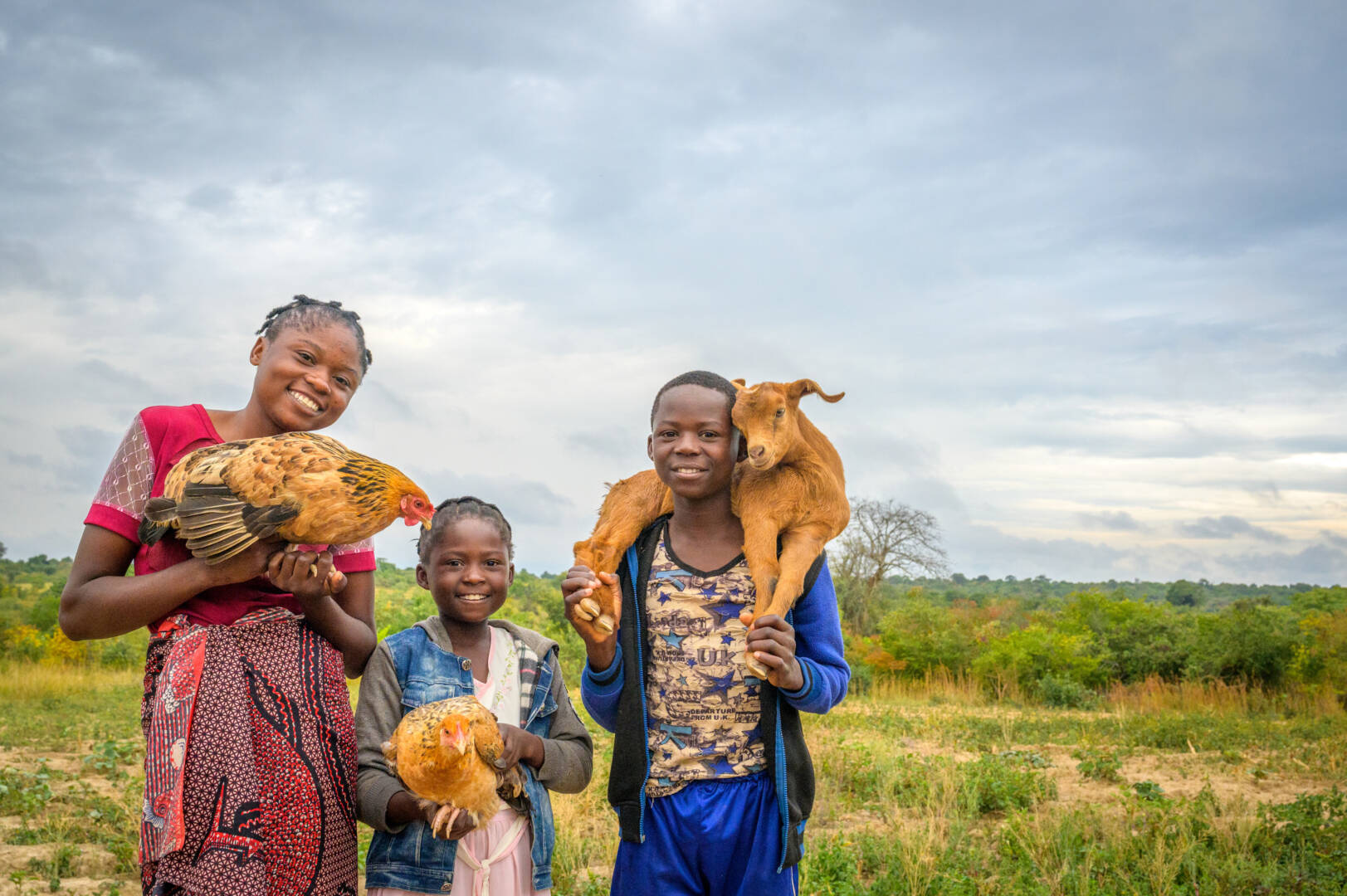Irresistible: One family’s journey to change
Story by Kari Costanza / Photos by Laura Reinhardt
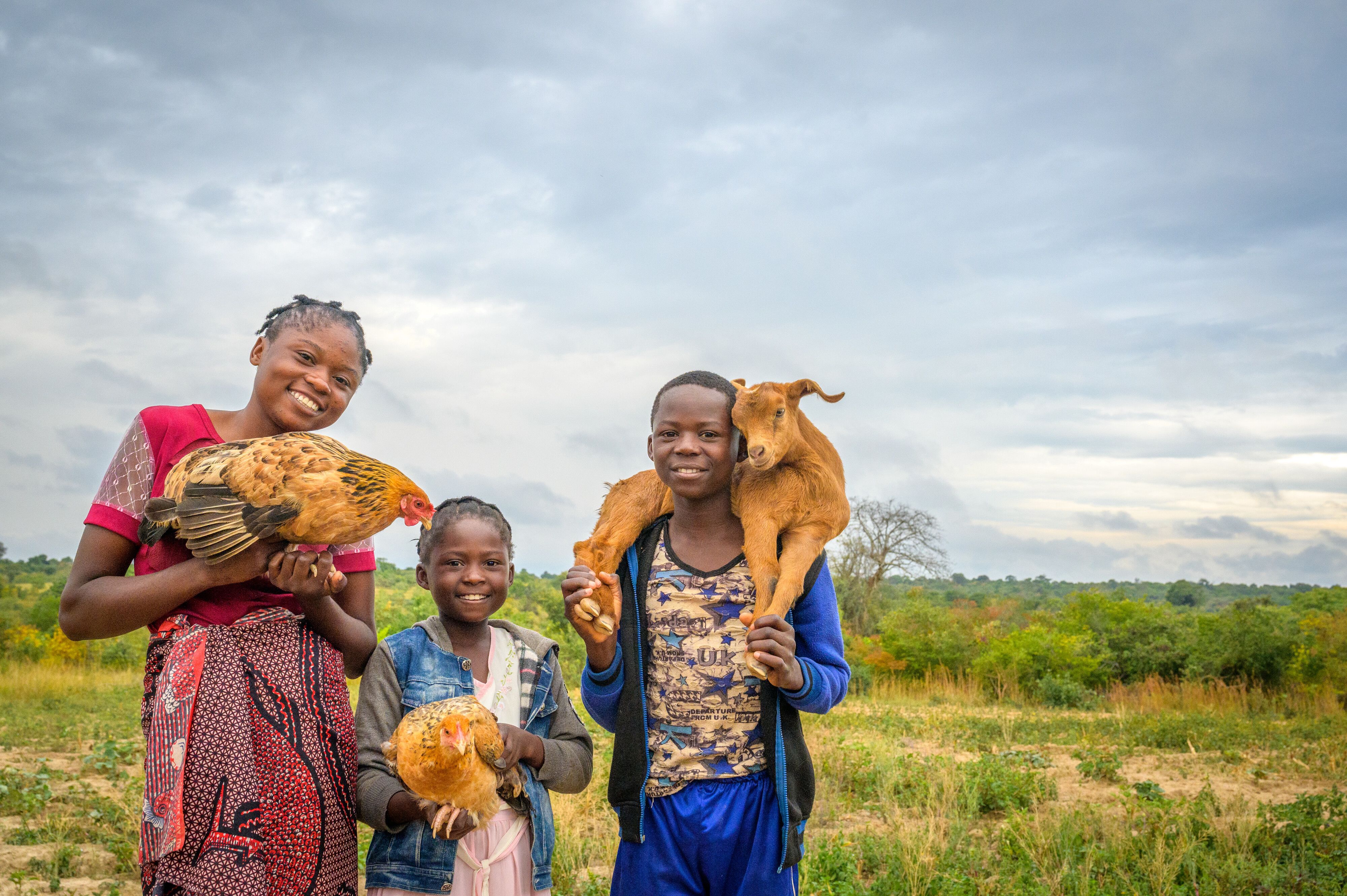
Chickens and goats brought smiles back to siblings Viola, Vinety, and Vincent — their family now equipped with tools to overcome poverty.
Chickens and goats brought smiles back to siblings Viola, Vinety, and Vincent — their family now equipped with tools to overcome poverty.
Caristo, a 45-year-old father of four, has an irresistible smile. When Caristo smiles, the world seems to brighten. But when he speaks of his childhood, his brilliant smile fades.
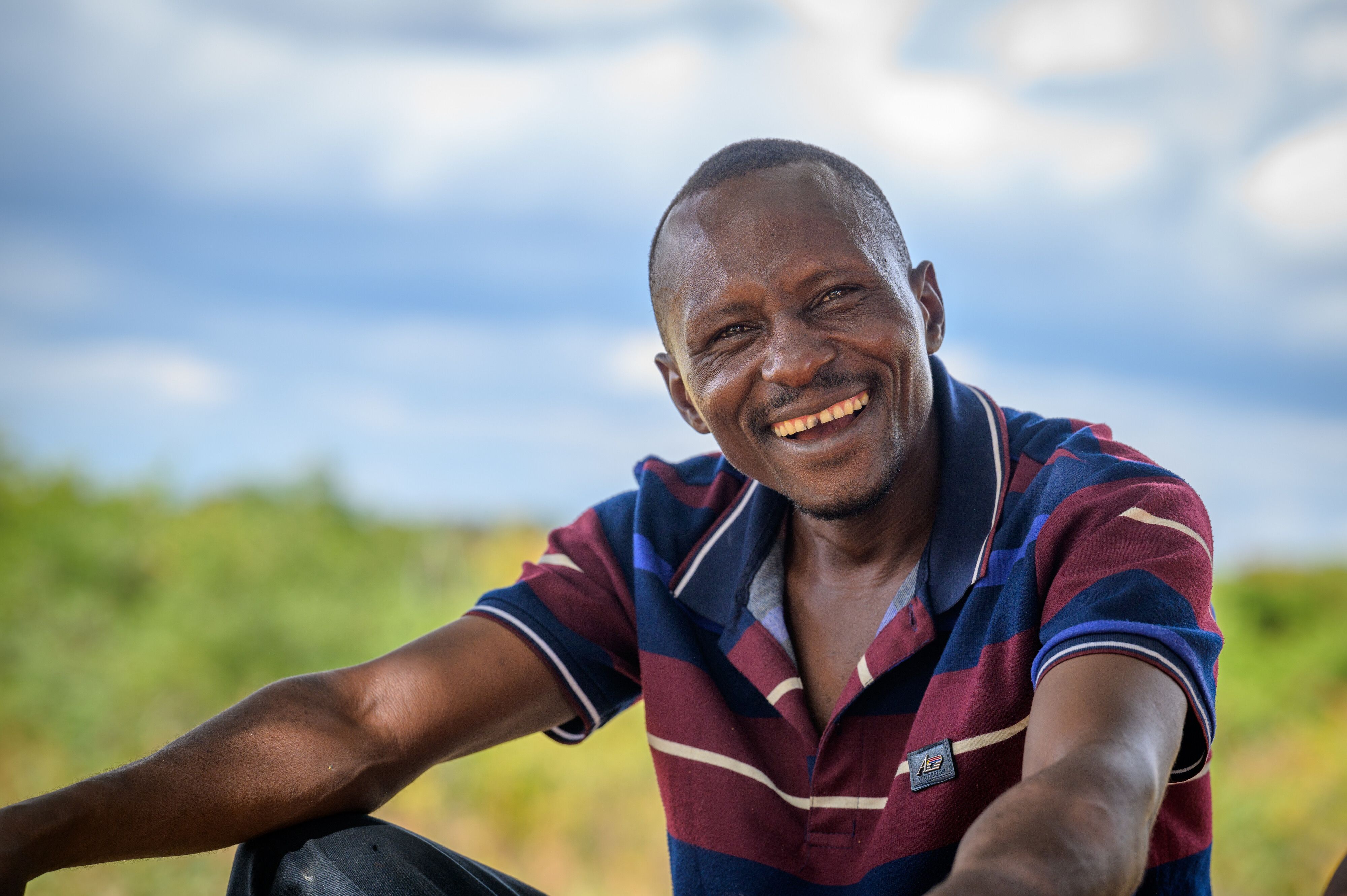
It was Caristo’s smile that attracted Jessy. She found him irresistible.
It was Caristo’s smile that attracted Jessy. She found him irresistible.
“There was so much poverty,” he says, remembering his time as a boy in southern Zambia. The family would sleep on mats they’d woven from reeds, laying burlap bags over the top to try to soften the dirt floor. The bags didn’t help. “It made it hard to sleep,” says Caristo. He would awaken with pain in his back and his ribs.
His father, Benny, tried his best. “He would always say, ‘Let me see what I can do,’ but at the end of the day, there wasn’t much he could do because it was hard to find resources,” says Caristo.
In school, Caristo was always a star pupil, ranking first or second in his classes. “My biggest dream was becoming an accountant,” he says. But there was no money for college. “When I realized that there was nothing much I could do after graduating, I just stayed home.”
Caristo graduated in 2002, a year when 24.4 million people in sub-Saharan Africa were living with HIV and AIDS — and that number would increase by another million in just two years. The disease ripped holes in Caristo’s community and throughout the region, leaving children orphaned and grandparents as caretakers. The middle generation — the workers — was hit hard. In 2004, 83% of families in rural Zambia lived in poverty.
“There is nothing we can do. There are no cattle to sell. There are no goats to sell,” Caristo recalls his mother saying. Caristo didn’t know how to move forward. “I just sat and contemplated what I could do with my life.”
Jessy in waiting
In the same village, at the same time, Jessy was contemplating her future as well. “I grew up not knowing my biological father,” she says. “My mother married another person. They had a hard life, so they couldn’t take care of me.” Jessy lived with her grandmother and dropped out of school at 15 when her grandmother died. She tried to become a housekeeper but was too young to work. “I stayed at home and waited for someone to marry me,” she says.
That someone was Caristo. He liked her smile, and she liked his.
“He seemed to be a very jovial and smiley person,” says Jessy. “He was different from other men because he never went to beer places to drink.”
Jessy was optimistic. “When we got married, my thoughts were that things would be better, we would have a good life, and we wouldn’t face any challenges.”
She couldn’t have been more wrong.
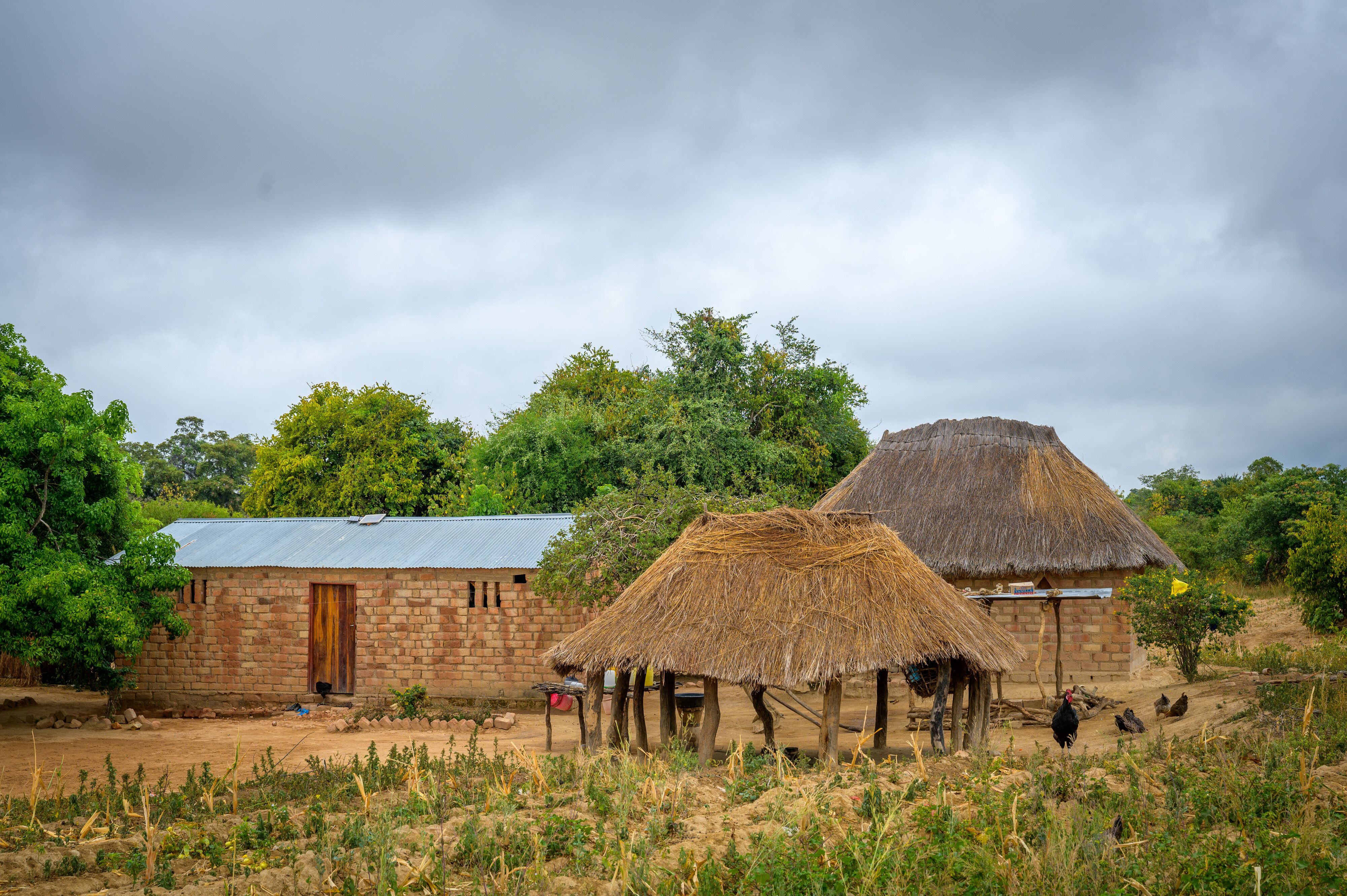
Caristo and Jessy’s brick house with a tin roof is a far cry from their first termite-infested home.
Caristo and Jessy’s brick house with a tin roof is a far cry from their first termite-infested home.
A family struggles
Caristo smiles ruefully, looking around at the land where he and Jessy have raised their four children, Virginia, 21, Viola, 16, Vincent, 13, and Vinety, 9. A neatly swept plot graced by a sturdy house he built himself, it’s a far cry now from what it used to be.
“When we came here, it was full of grass and shrubs. We made a small structure and covered it with grass.” The family lived in that leaky mud hut, hungry and hopeless. Termites would attack them at night.
“It was very hard to live in a structure like that,” he says. “It was most painful, especially in the rainy season; everything would get wet.”
“We didn’t have enough food to eat,” says Jessy, her face veiled in sorrow. “We could not go to church because we did not have clothes to wear. We had no soap to wash with.”
“Virginia and Viola suffered the most,” says Jessy. “[Viola’s] health was really affected because she lacked nutrients from different food. Her belly protruded. She had to be dewormed. Because of the same hunger, she used to vomit.” It made Jessy cry. “My greatest fear was that she would die.”
Viola’s childhood memories echo her father’s. “We didn’t have a proper place to sleep on,” she says. “We slept on sacks on the floor.”
She tried going to school, even though she had no shoes. The teacher would turn her away. “Every time I wanted to go to school, and the school demanded fees, I would tell my dad, and he would tell me he didn’t have them,” says Viola.
The cycle of poverty continued.
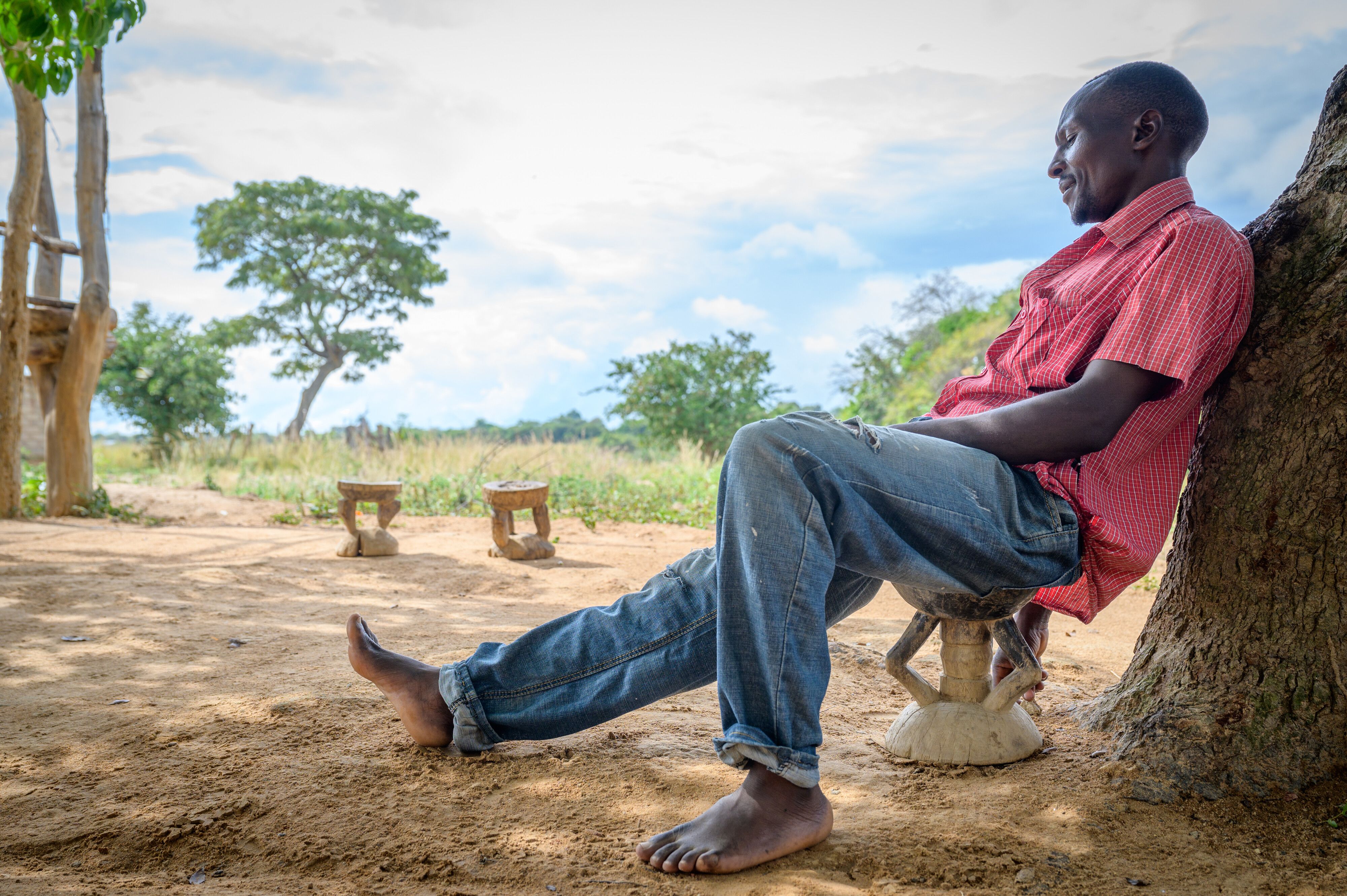
At one time, Caristo felt hopeless about his future.
At one time, Caristo felt hopeless about his future.
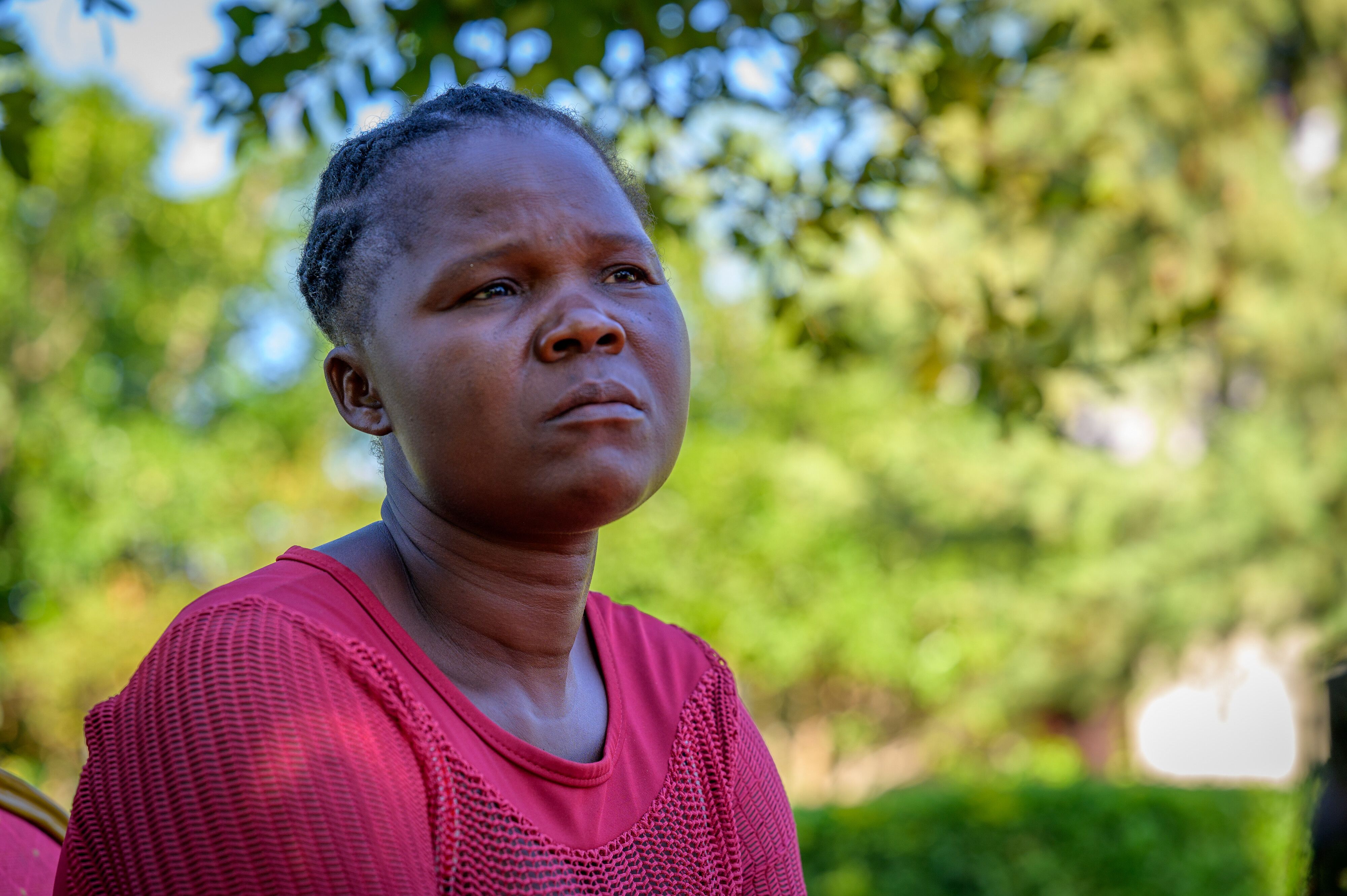
Jessy soon realized that her marriage was in trouble.
Jessy soon realized that her marriage was in trouble.
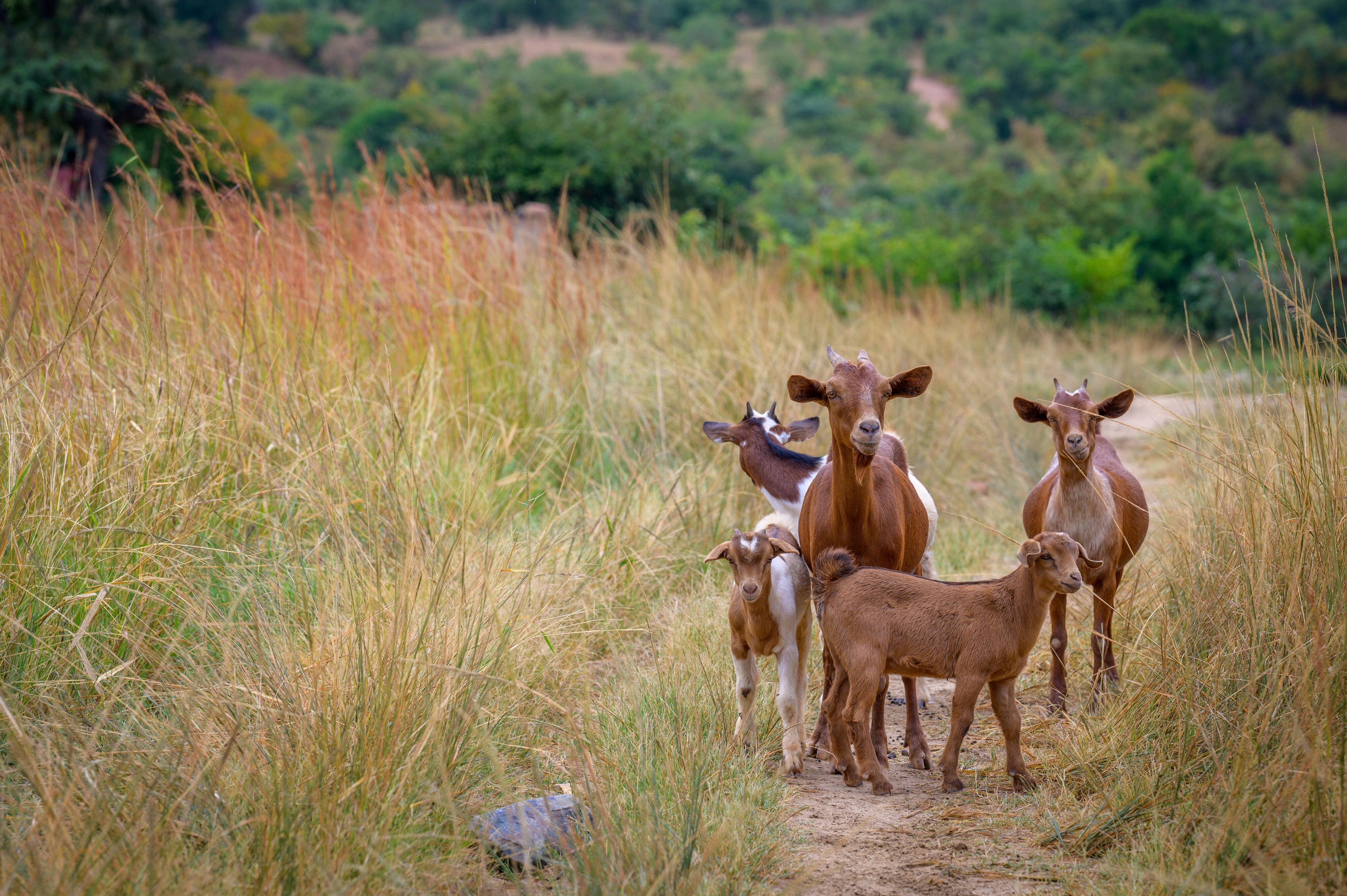
Caristo's herd of goats started off with just five.
Caristo's herd of goats started off with just five.
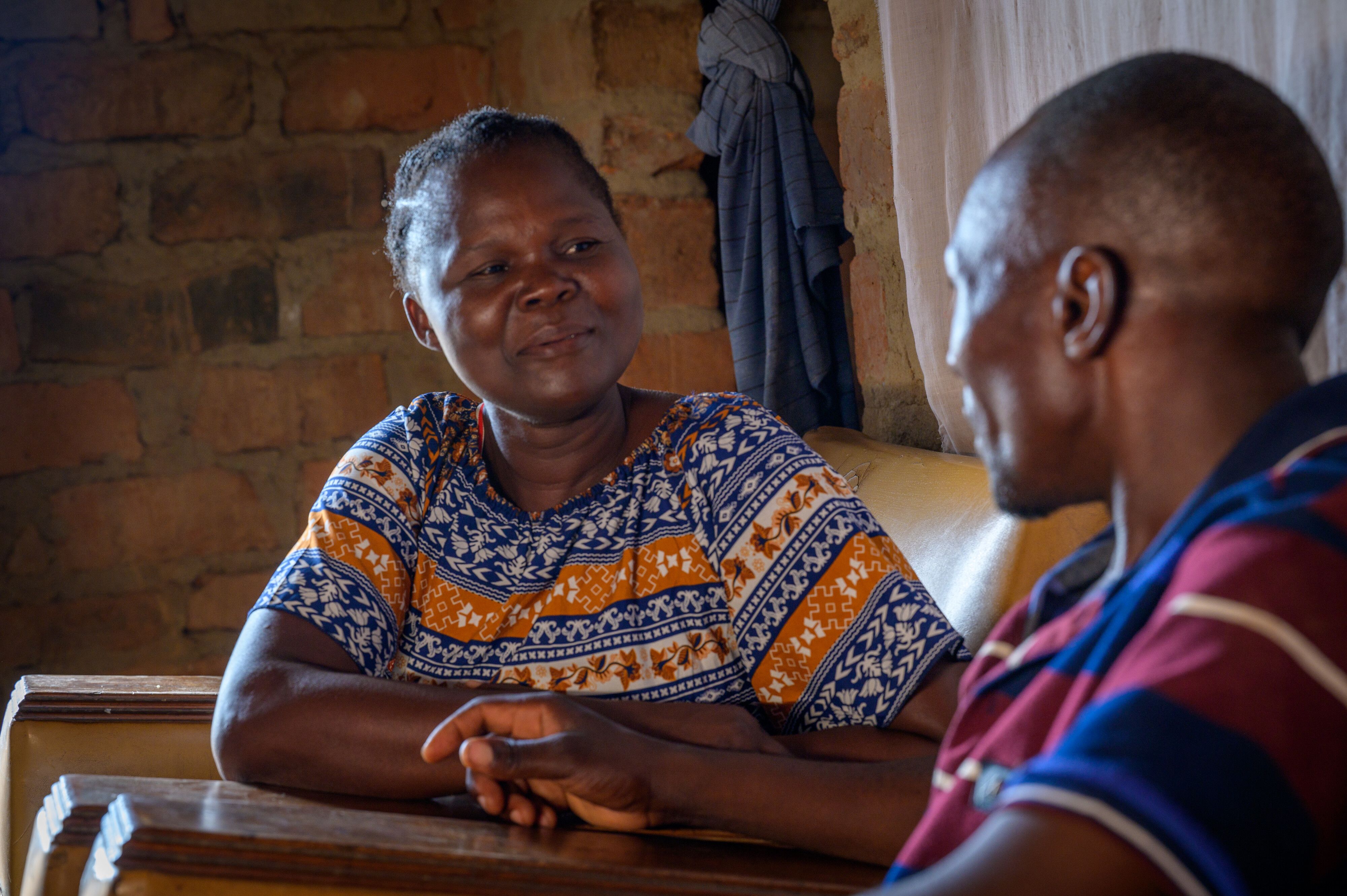
It took a change in mindset for Jessy and Caristo to begin to dream about the future.
It took a change in mindset for Jessy and Caristo to begin to dream about the future.
A shattered man
World Vision started a child sponsorship program in Hamaundu in 2010 when Virginia was 7 and Viola was 2. At that time, mothers like Jessy were collecting water from dirty ponds for their families’ needs. One ill-equipped health clinic had a single nurse on staff who did her best to serve 15,000 people. Farming felt fruitless. “Seeds used to be a big problem,” Caristo’s mother, Eniah, told World Vision magazine in 2014. “We didn’t have any form of income so we couldn’t buy them.”
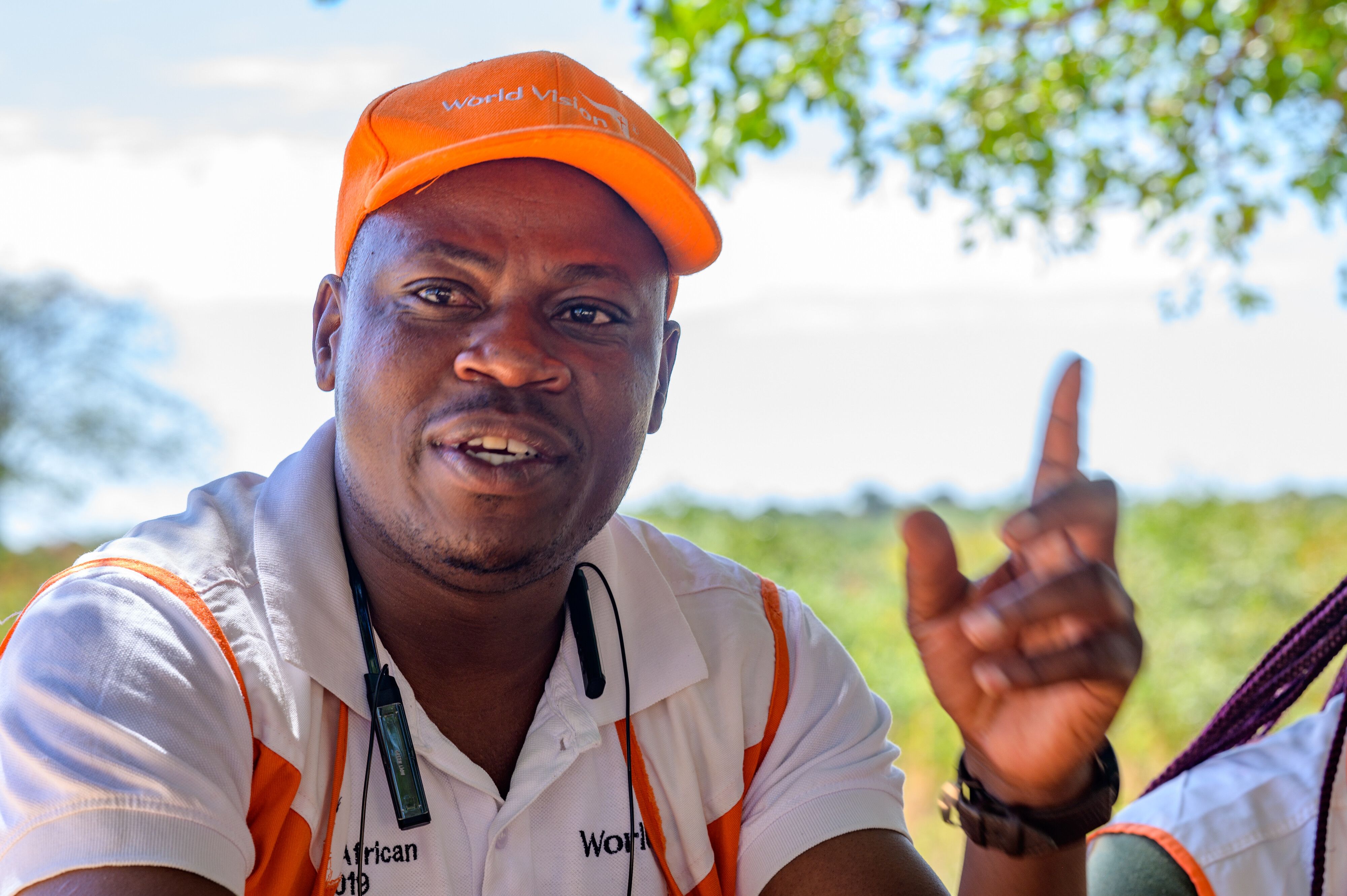
World Vision's Dominic Banda shares his knowledge.
World Vision's Dominic Banda shares his knowledge.
World Vision’s local livelihoods and resilience specialist Dominic Banda says that when he saw how Caristo’s family was living, he wanted to cry. “How do they fit in that house?” he wondered. “What are they going to eat? Are they going to survive? Maybe the next thing we would hear [about] — is a funeral.”
Compelled by his commitment to serve the most vulnerable, Dominic began to visit the family in 2017 and have heart-to-heart talks with Caristo. He remembers Caristo telling him he believed he would always be poor: “He said, ‘I feel like God created me like this. And I was meant to live a life like this and probably would die just like this.’”
Dominic also observed that Jessy was afraid of her husband. She would rarely sit near him. She wouldn’t answer questions. When Caristo came home from working menial jobs, they would argue. Jessy didn’t understand how Caristo could be busy all day but unable to provide for their needs.
Caristo remembers those days: “My wife used to be scared of me. When she saw me coming, she would run to the kitchen.” He says he felt he had to inspire fear in others to be a man. But in reality, the relationship was broken from years of living in poverty.
“I had lost respect for him,” Jessy says.
And yet, there was something about Caristo that drew people to him. Maybe that brilliant smile, a trait he’d inherited from his father.
Dominic started to wonder if Caristo would be a good candidate to receive goats donated through the World Vision Gift Catalog. Other people in the community were raising and breeding them successfully. Although he had his doubts about Caristo — “He never owned a single goat, and he was very poor” — Dominic suggested that Caristo attend two World Vision courses that might help prepare him.
It was a turning point for Caristo. “God answered my prayers through World Vision,” he says. “When I look back, I suffered a lot. When World Vision came through, they empowered me with knowledge.”
Learning about love
Andoni Phiri, a pastor in Caristo’s community, teaches World Vision courses in Biblical Empowered Worldview and Celebrating Families. Biblical Empowered Worldview classes teach that all people are made in the image of God, and that — far from wanting us to be poor — God calls and equips us to thrive as we love and care for ourselves, our families, and our neighbors. Celebrating Families workshops are taught by pastors to help couples learn to heal broken marriages and provide unconditional love to their children.
Through Biblical Empowered Worldview, Pastor Phiri learned what he calls the “Three Ds.” Sitting under a tree in his front yard as his grown sons spray the family cows to keep them free from ticks, the pastor’s face lights up as he explains.
“The first ‘d’ is discover,” he says. “We want people to discover themselves. Who are they?” Once they’ve discovered who they are, people are able to dream — the second “d” — as co-creators with God. “If our God was able to create the heaven and the earth and made us in His image, then we can create heaven’s image,” he says.
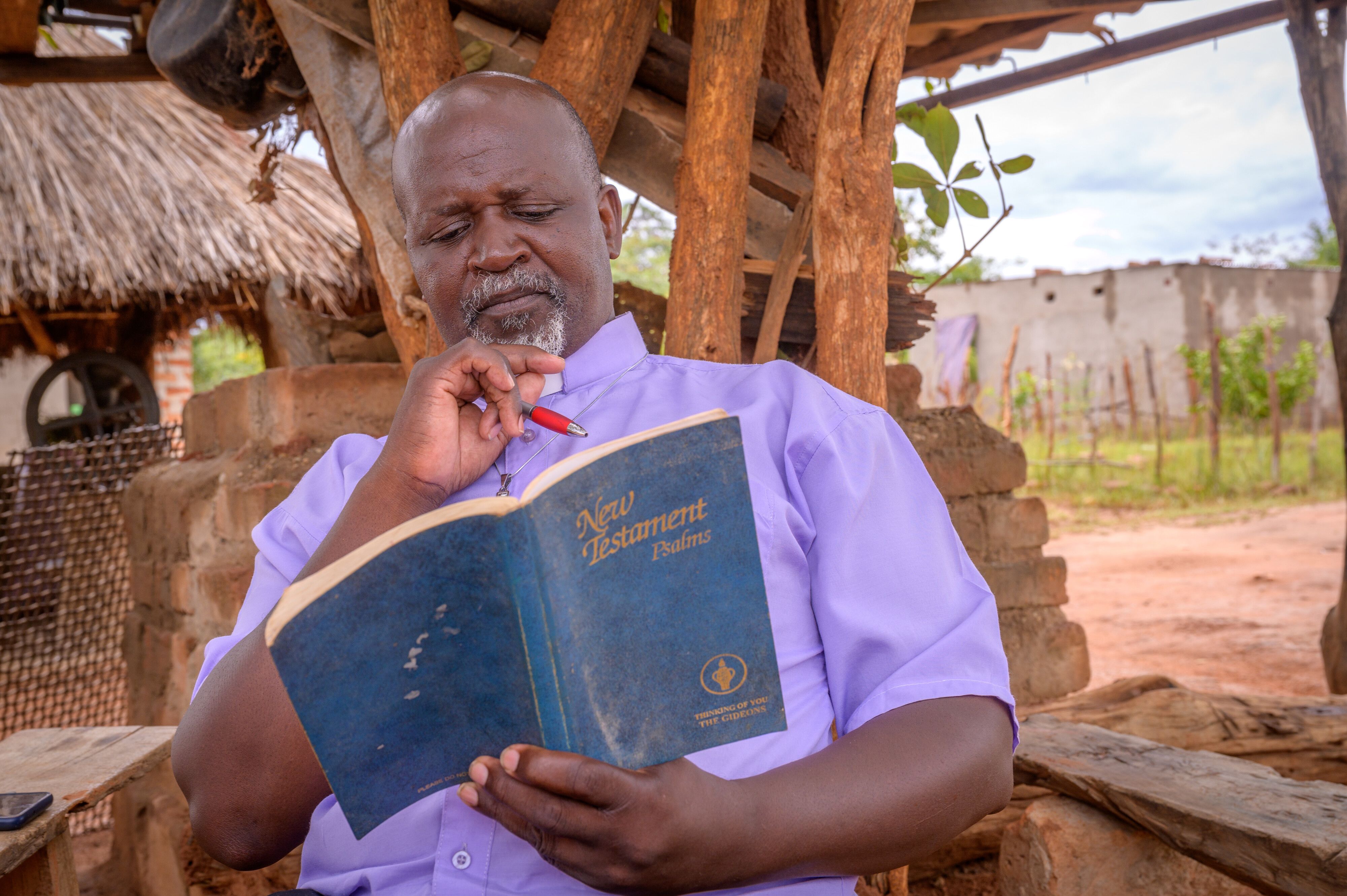
Pastor Adoni Phiri reads from a well-worn New Testament.
Pastor Adoni Phiri reads from a well-worn New Testament.
Pastor Phiri dreams boldly. “I sit here today and am dreaming that I should have a helicopter,” he says, laughing. “The first in the village. It is a big dream. But that’s the dream process that we move people into in Biblical Empowered Worldview. If your vision can fit into your pocket, that is not a vision. The vision must overwhelm you. It must give you sleepless nights.”
Finally, he teaches participants to develop — the third “d”: “You can have a dream, but next, write down your vision and run with it. Implement it. Whatever you have in your dreams must come to reality. It must begin to show you are moving in the direction.”
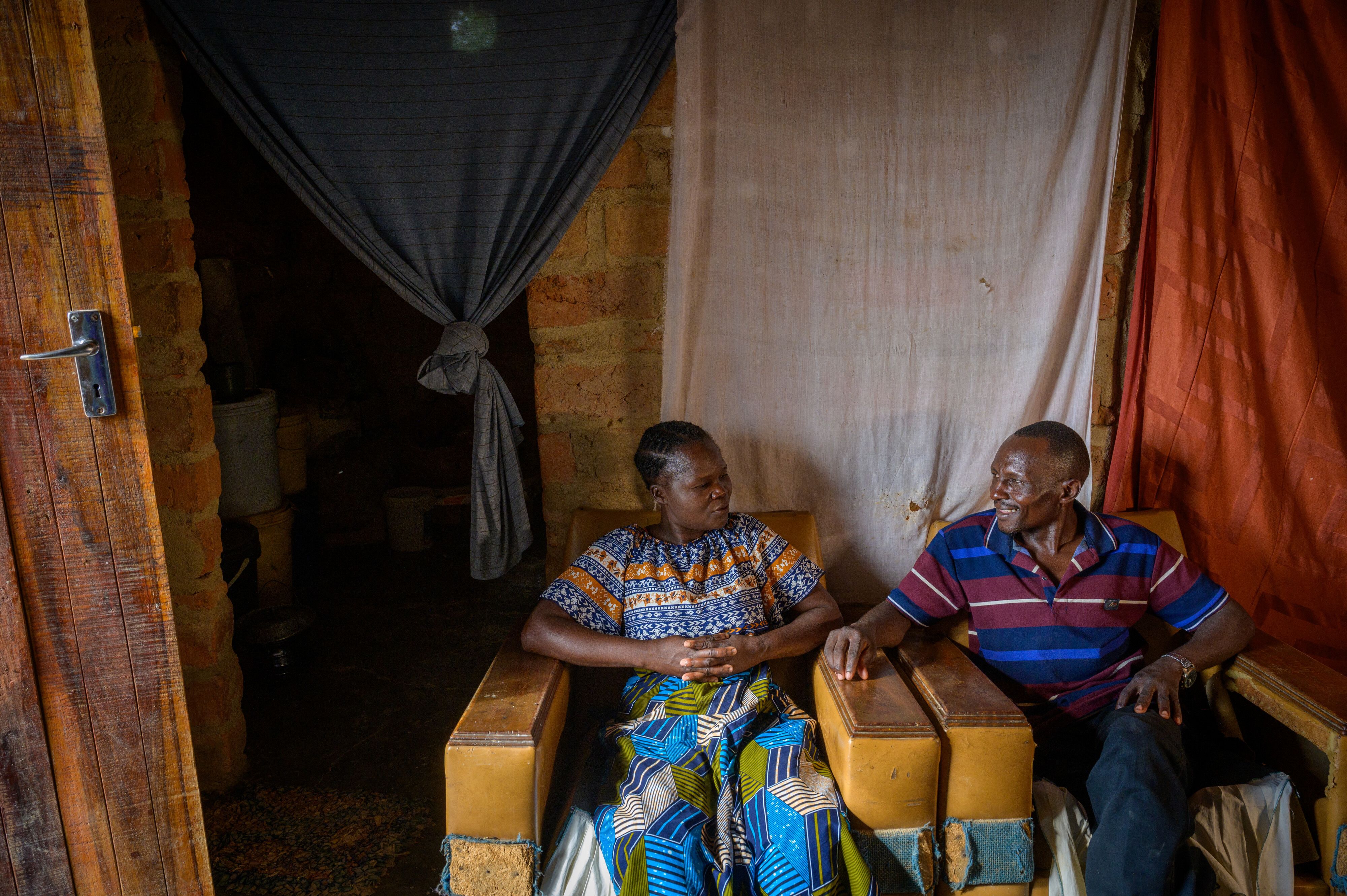
World Vision’s Celebrating Families training helped Jessy and Caristo mend their marriage.
World Vision’s Celebrating Families training helped Jessy and Caristo mend their marriage.
Caristo says that what he learned changed his life. He became convinced, in a way he hadn’t understood before, that he was made in the image of God. That God didn’t want him to be poor.
“We saw a big change immediately after the training,” says Jessy. “Especially just his conduct, his way of speech towards me, the wife, and the children. And he was able, for the first time, to show us where he was leading us as a family.”
Together, the couple took the five-day Celebrating Families training and worked on mending their broken marriage. They learned to respect and listen to one another and to parent their children with love and tenderness.
“I stopped being scared of him,” says Jessy.
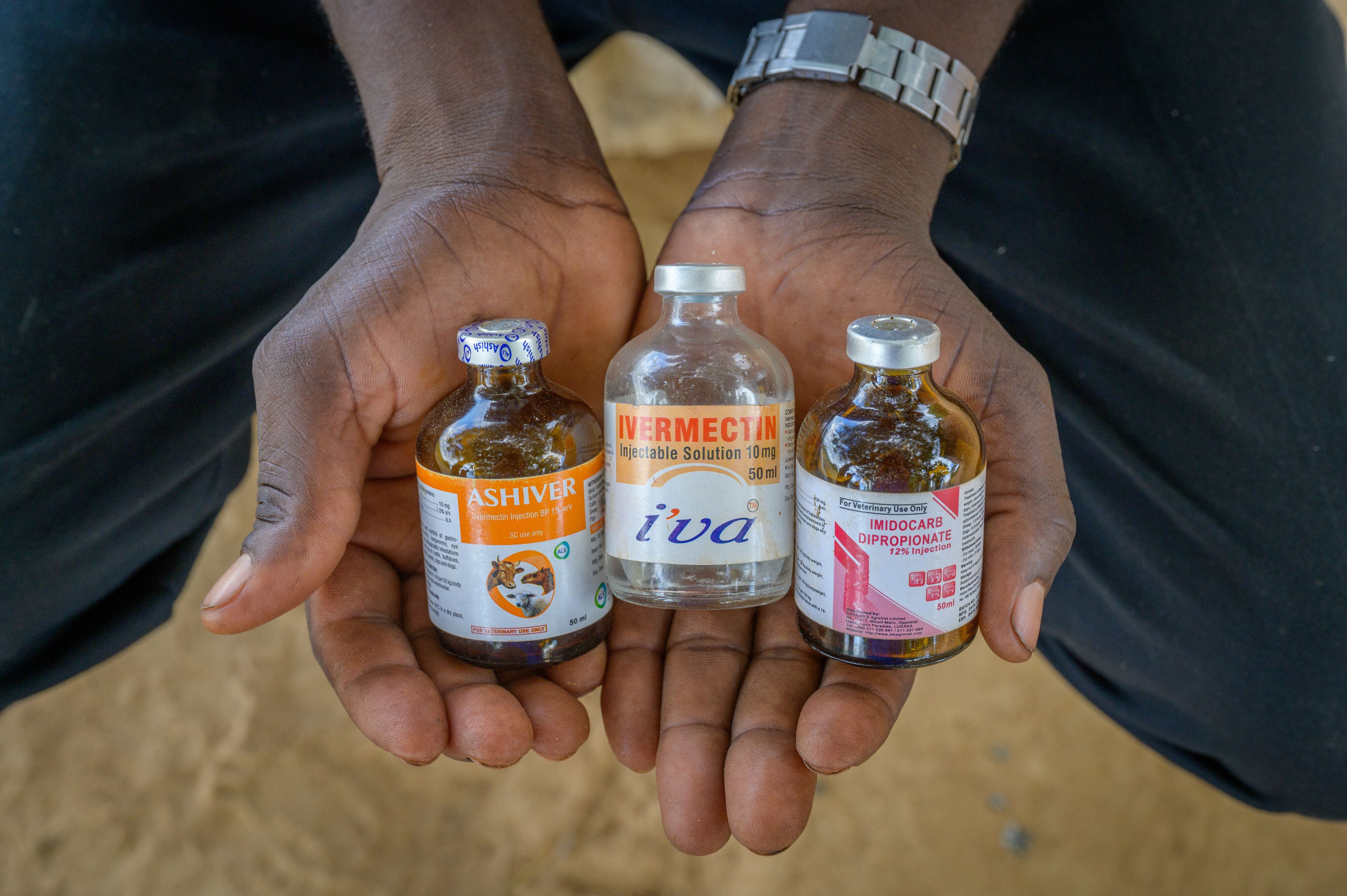
Caristo holds some of the medicine he uses in his role as goat doctor.
Caristo holds some of the medicine he uses in his role as goat doctor.
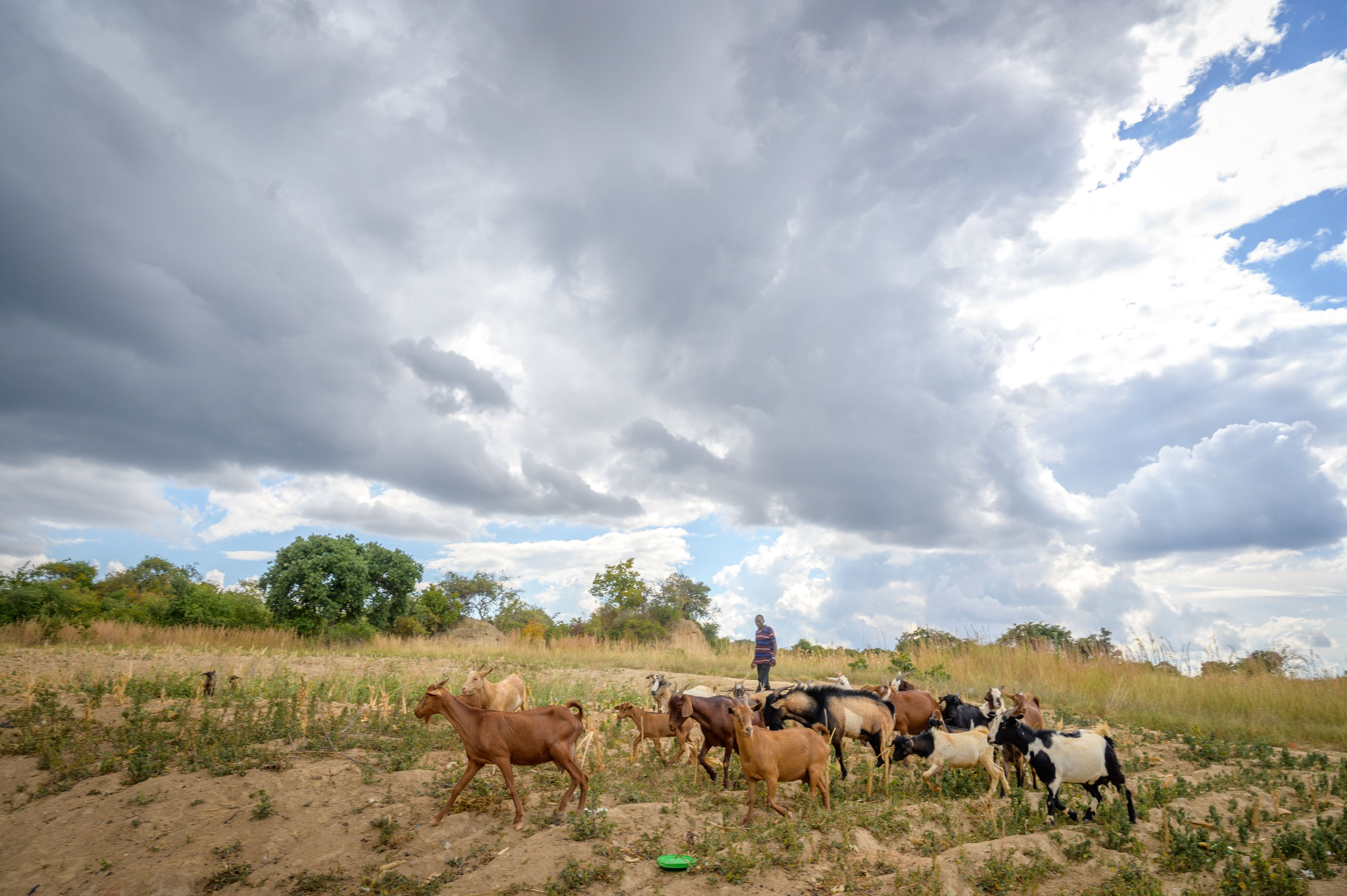
Caristo’s goat herd keeps multiplying.
Caristo’s goat herd keeps multiplying.
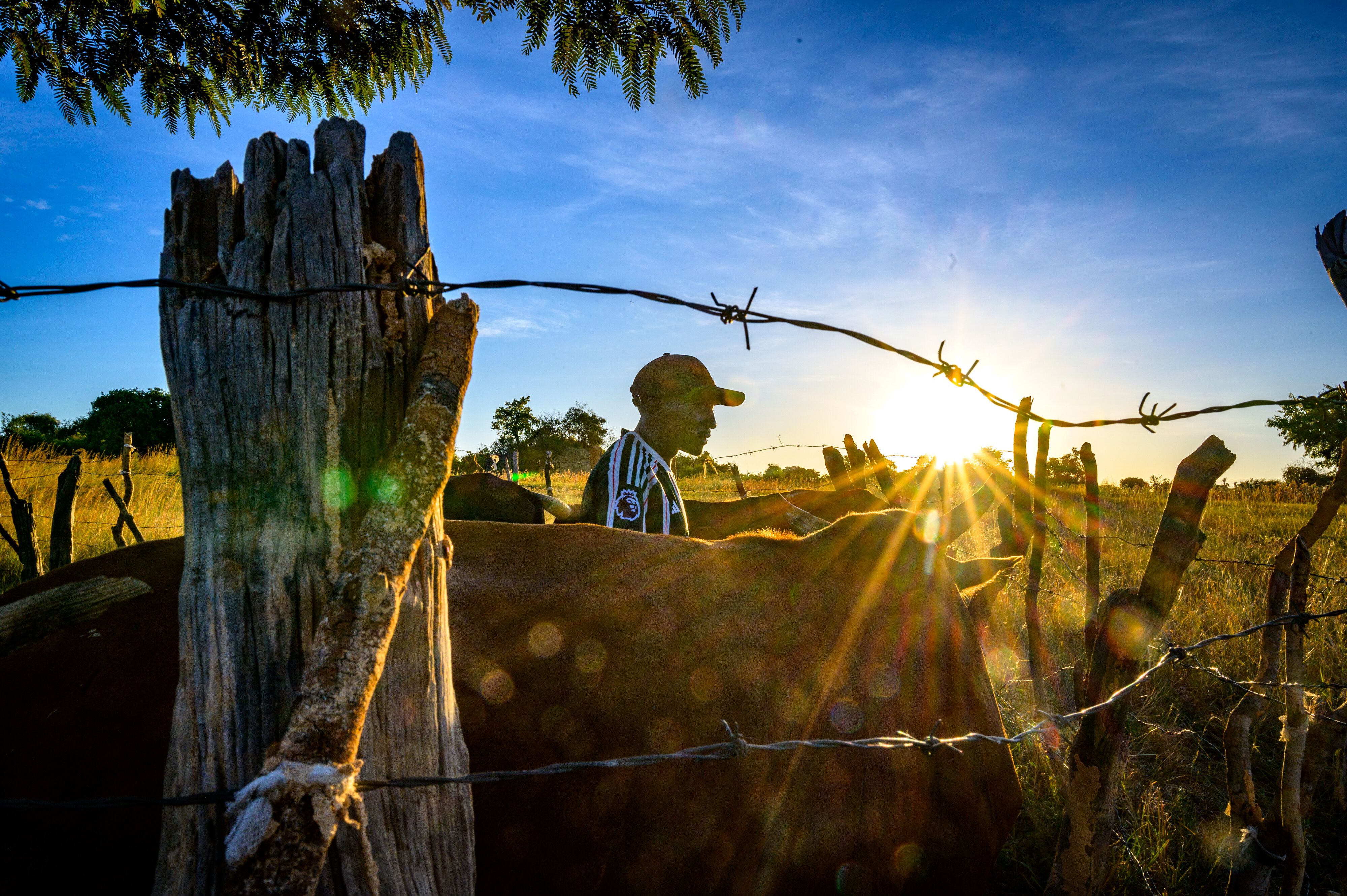
Now Caristo even has cows — a sure sign of wealth in his village.
Now Caristo even has cows — a sure sign of wealth in his village.
The doctor is in
Dominic was delighted with Caristo’s progress after Biblical Empowered Worldview training. “When I took him for the training, I was amazed at the rate that he applied the skills.” He remembers thinking, “He might be an example,” a role model for the community.
But he didn’t give him goats. Not yet. In early 2018, he trained Caristo as a volunteer community livestock attendant — or goat doctor. He supplied Caristo with measuring tape to assess a goat’s weight and with medicine to treat any sickness.
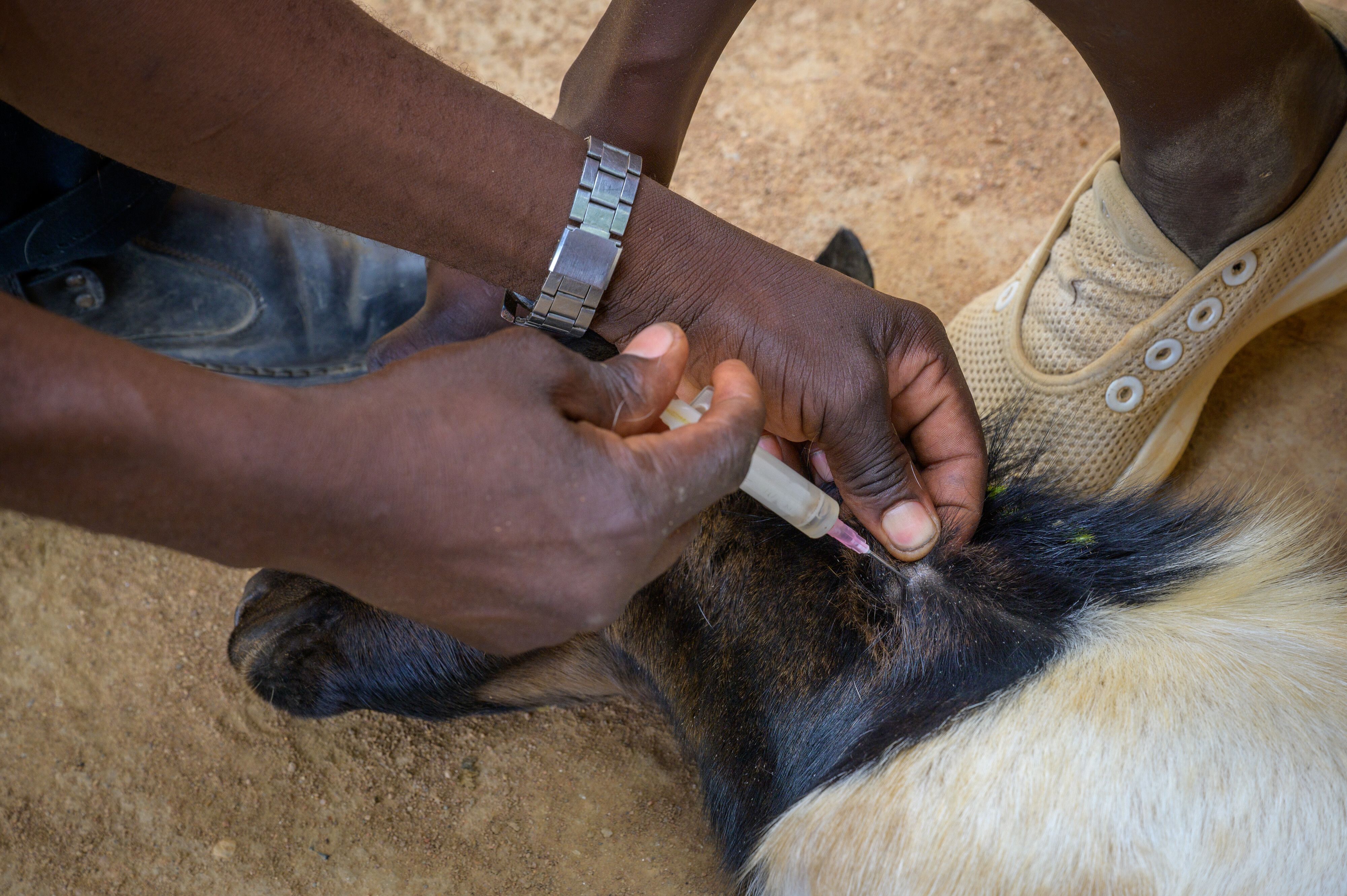
Caristo vaccinates goats to keep them healthy.
Caristo vaccinates goats to keep them healthy.
It turned out Caristo had a knack for doctoring. Community members began to call on Caristo to visit their goats two or three times a week.
Dominic’s doubts were washed away. Caristo had proven himself capable. He was a changed man, and he was ready to raise goats.
There was only one problem: Jessy didn’t want them.
Faith over fear
Jessy was nervous. “My biggest fear was — what if we failed to take care of the goats and they died?” she says. “What if World Vision comes back and charges us? We had no money. I did not know how to take care of the goats.”
But Caristo knew how. He was a sponge when it came to learning. And now he knew that God was on his side.
Jessy eventually came around, having seen the change in her husband. And she was not disappointed. “I was very happy to see that he could take care of the goats. I had earlier doubted him. But they multiplied, and our life transformed,” says Jessy.
Viola’s health began to improve thanks to healthy food and a sturdy shelter. “She was always sad because of the pain she was experiencing,” says Jessy. “Since the coming of the goats, her health improved. Now, we can provide her with the required foods. It’s rare to see her sick.”
And she’s happy: “I noticed that she started smiling when we received the goats from World Vision,” says Jessy.
“God answered my prayer through the goats,” says Caristo. “He gave them to me to transform my life.” And they’re changing not only his life, but his neighbors’ lives as well. When the original five goats from the Gift Catalog became 15, he gave away five. And his goats kept multiplying. Since 2018, he has had between 400 and 500 goats.
When the children asked their father for milk to drink, he sold eight goats and bought a cow. Then another. And another. Today, he has eight cows.
Back to school
Jessy and Caristo’s oldest daughter, Virginia, attends boarding school and is preparing to take her final exams. Unlike her father, she will be able to go on to college.
The younger children are back in school, including Viola — now with shoes to wear.
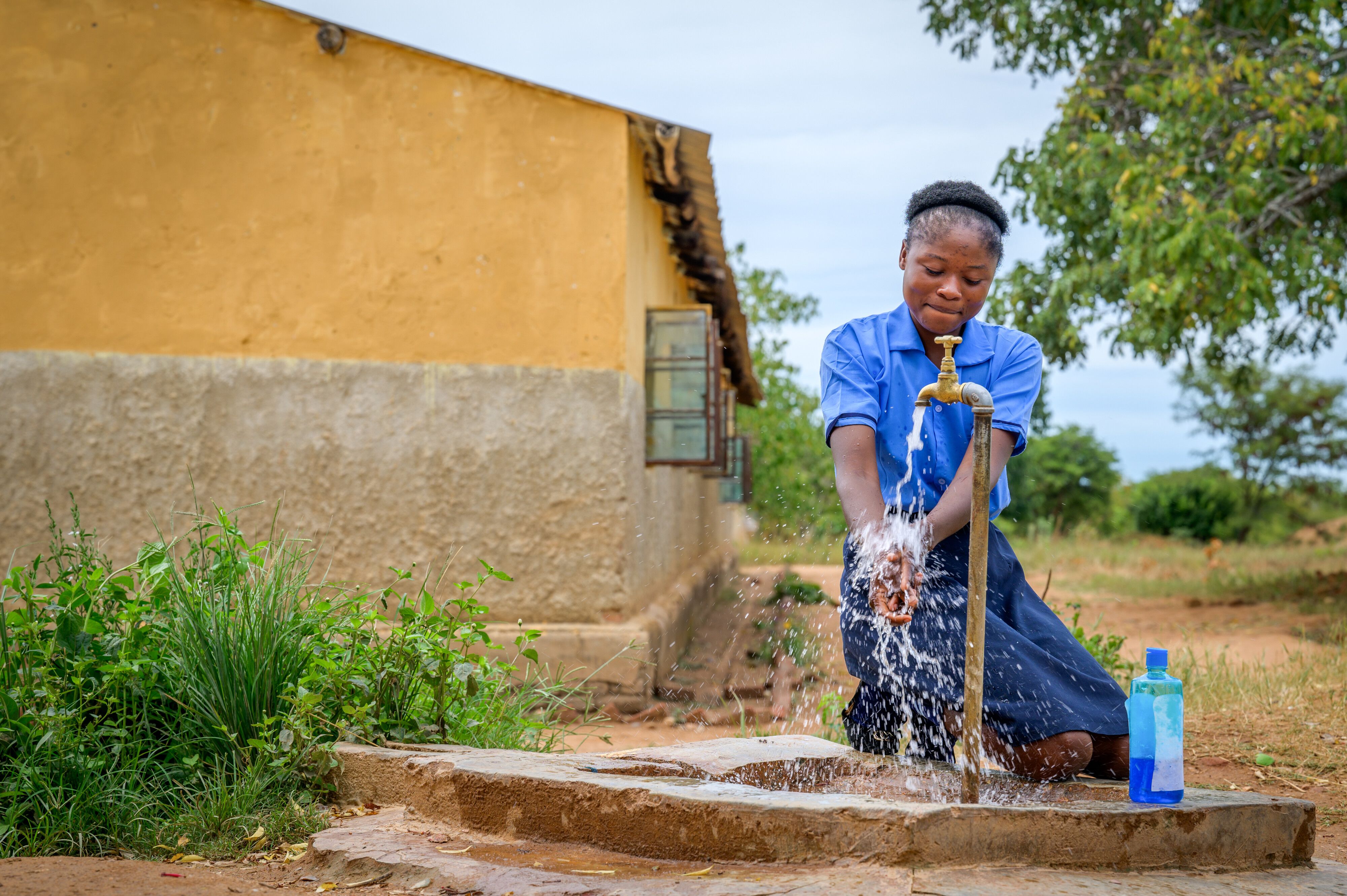
Viola can easily wash her hands at the water system World Vision helped build at her school.
Viola can easily wash her hands at the water system World Vision helped build at her school.
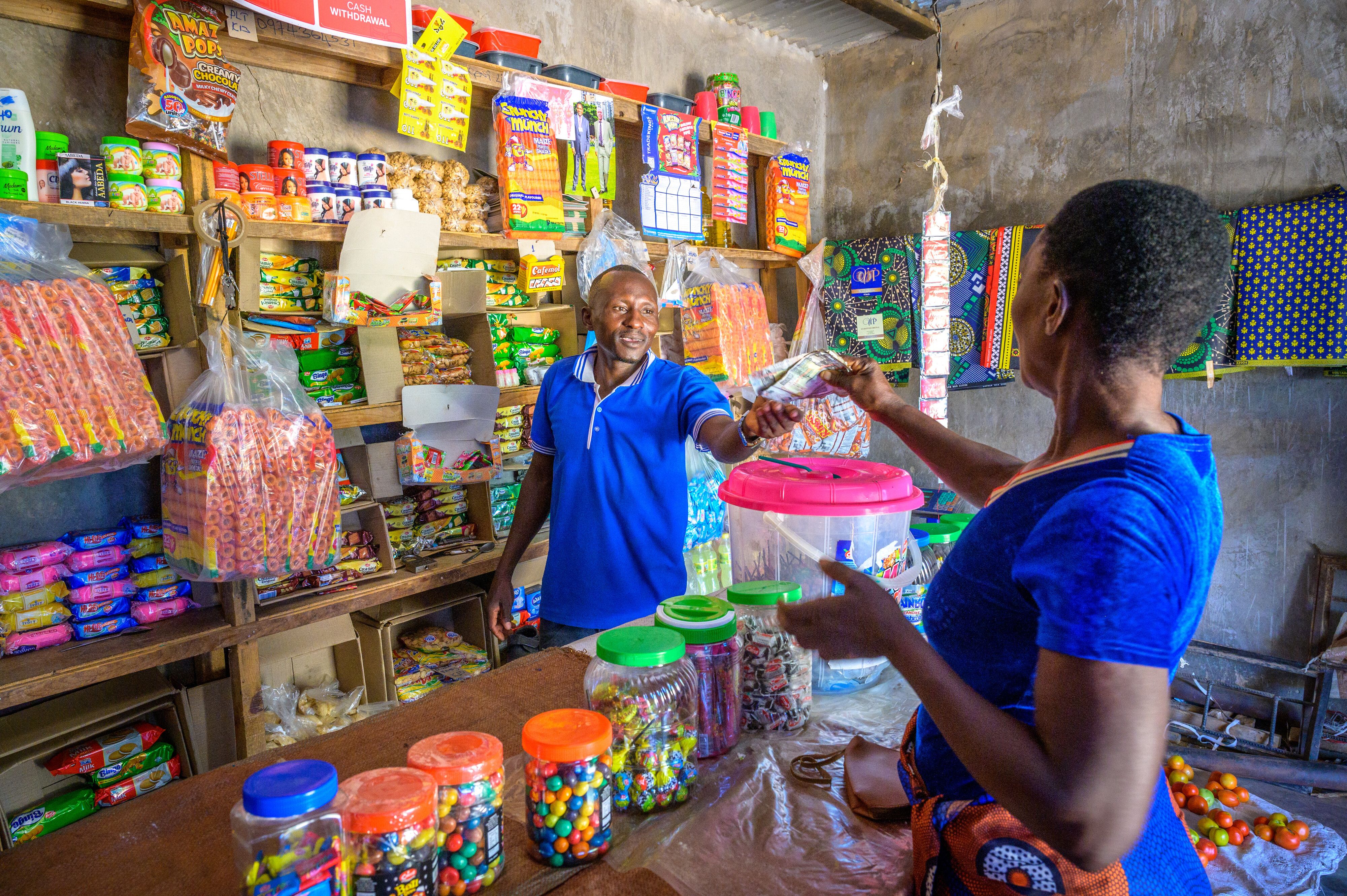
Caristo helps a customer in his family’s shop.
Caristo helps a customer in his family’s shop.
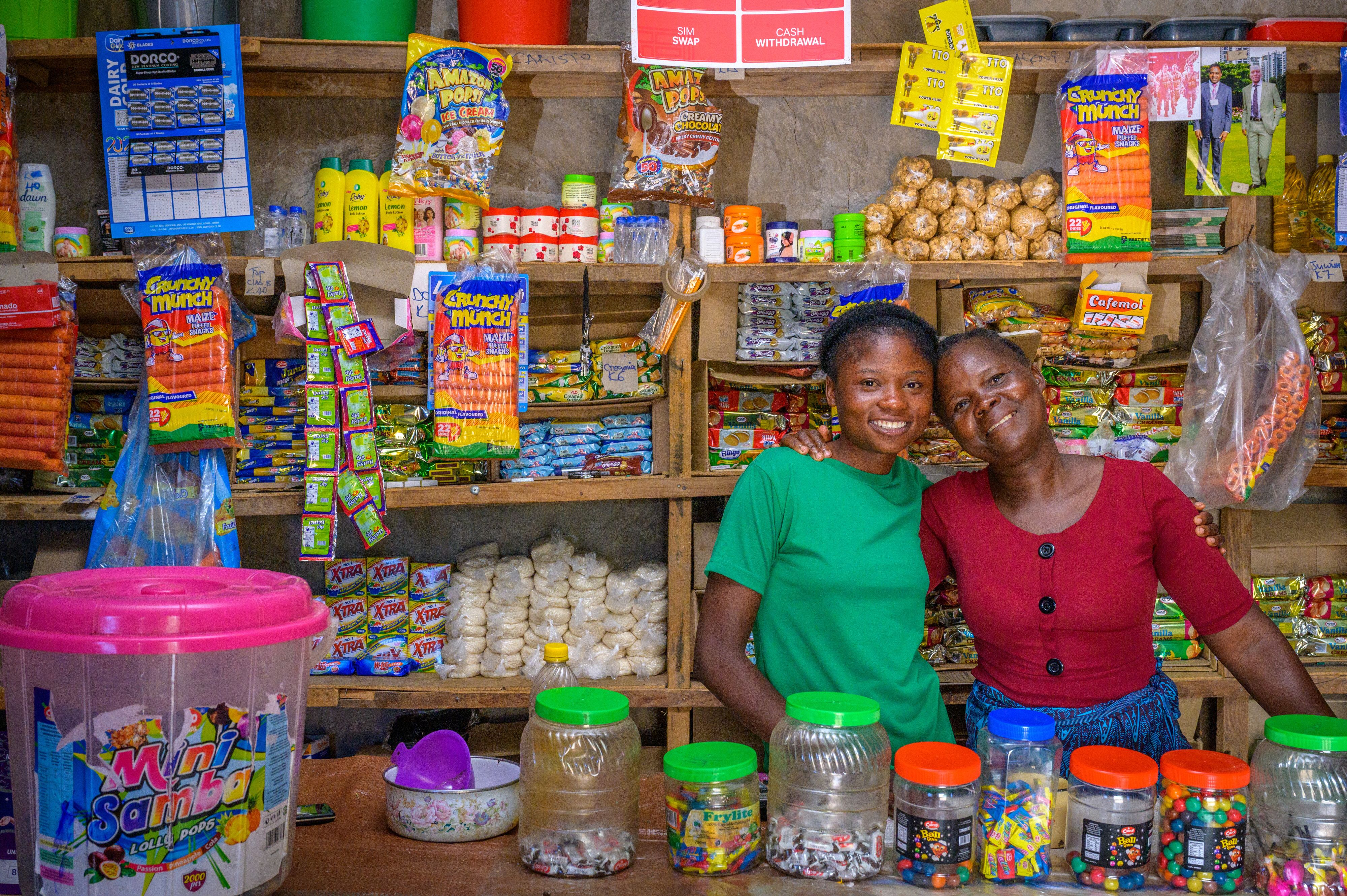
Viola treasures these moments with her mother, Jessy, in their busy grocery store.
Viola treasures these moments with her mother, Jessy, in their busy grocery store.
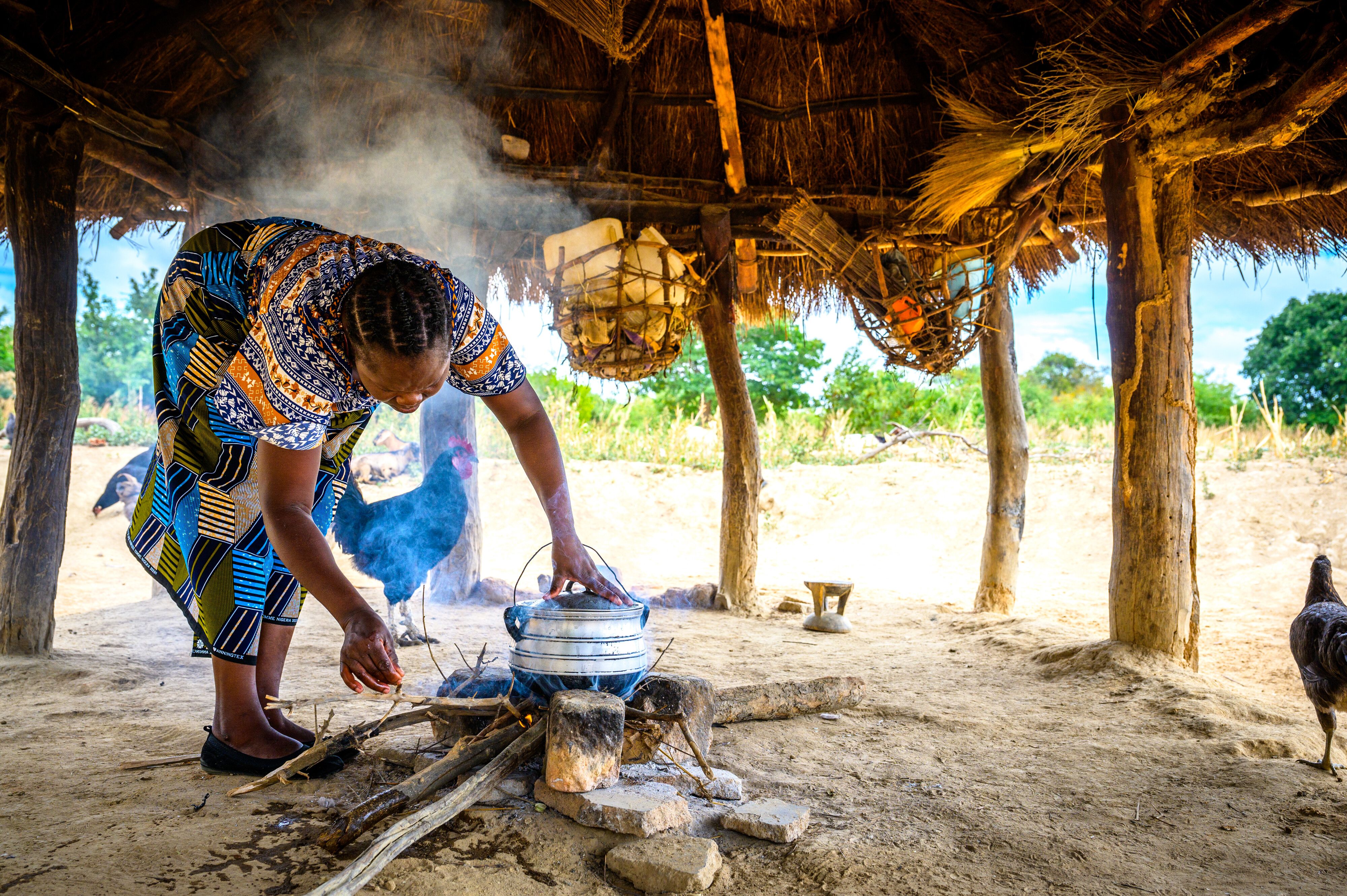
Thanks to her membership in a World Vision savings group, Jessy now makes her own money, some of which she used to purchase new pots for her kitchen.
Thanks to her membership in a World Vision savings group, Jessy now makes her own money, some of which she used to purchase new pots for her kitchen.
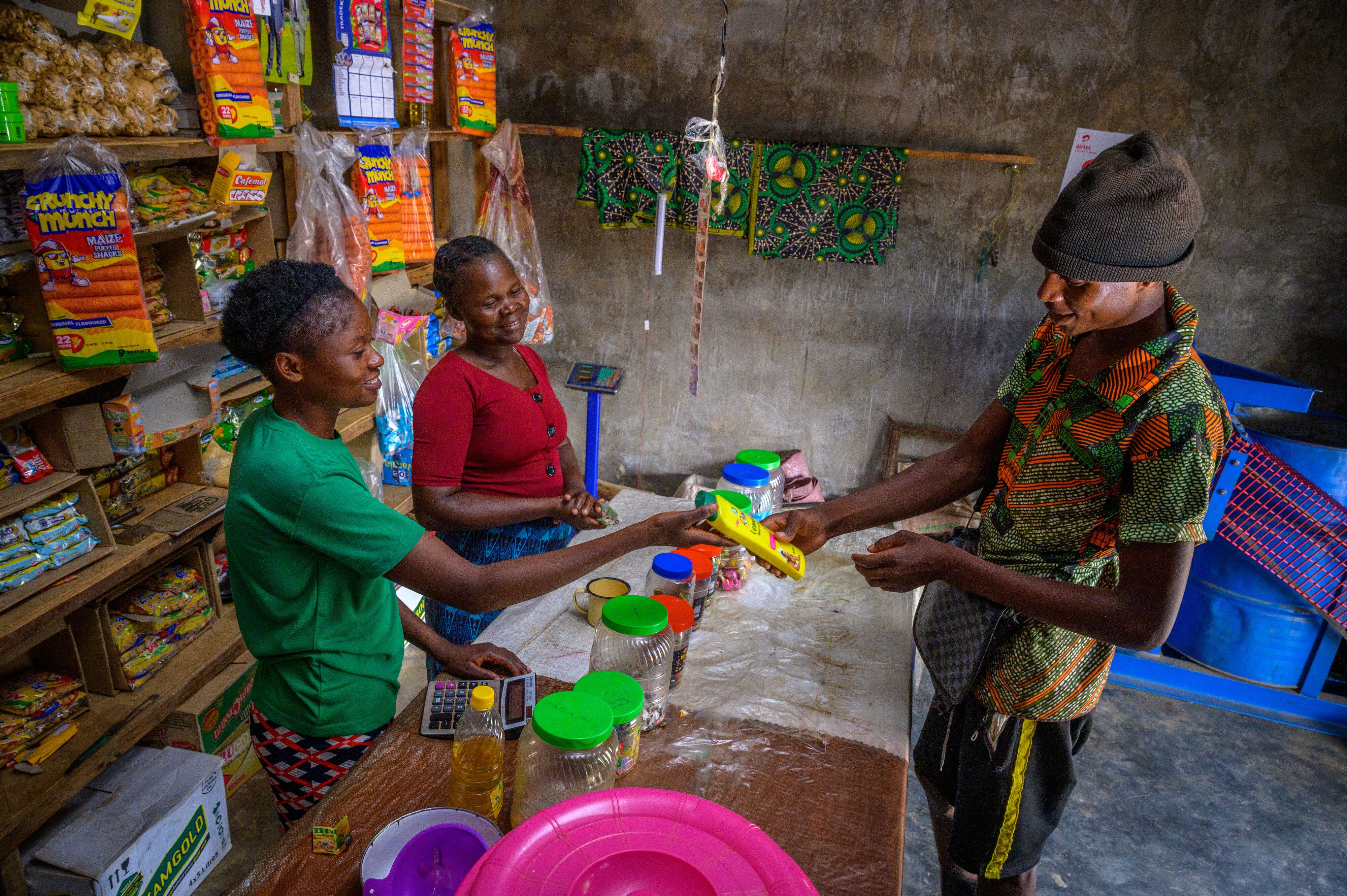
The family’s grocery store is the only one in the community, so customers frequent the colorful space.
The family’s grocery store is the only one in the community, so customers frequent the colorful space.
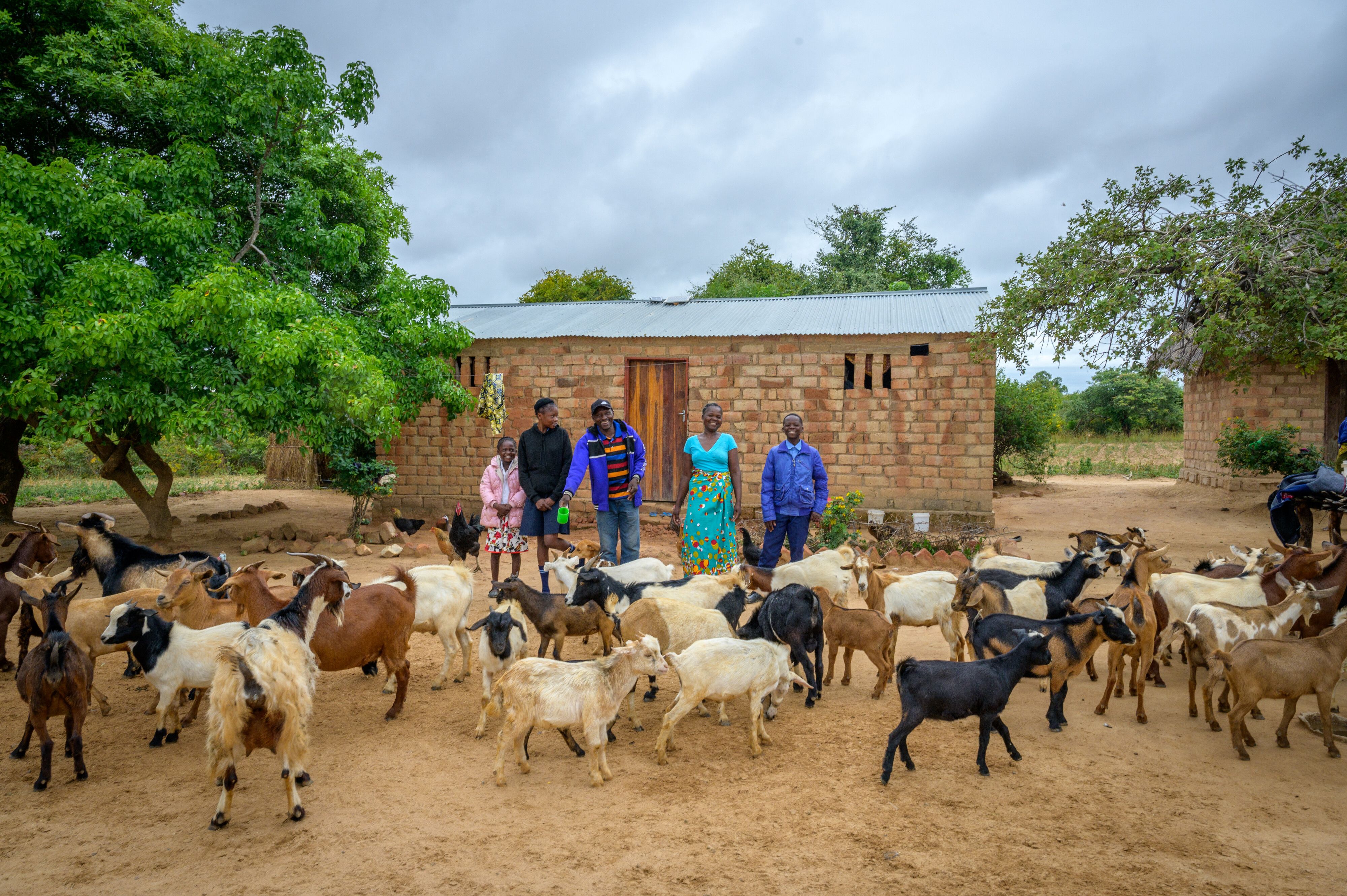
From living in a leaky hut and fearing for their children’s health to building a stronger marriage, a sustainable livelihood, and a secure home, Jessy and Caristo have truly seen their lives transform.
From living in a leaky hut and fearing for their children’s health to building a stronger marriage, a sustainable livelihood, and a secure home, Jessy and Caristo have truly seen their lives transform.
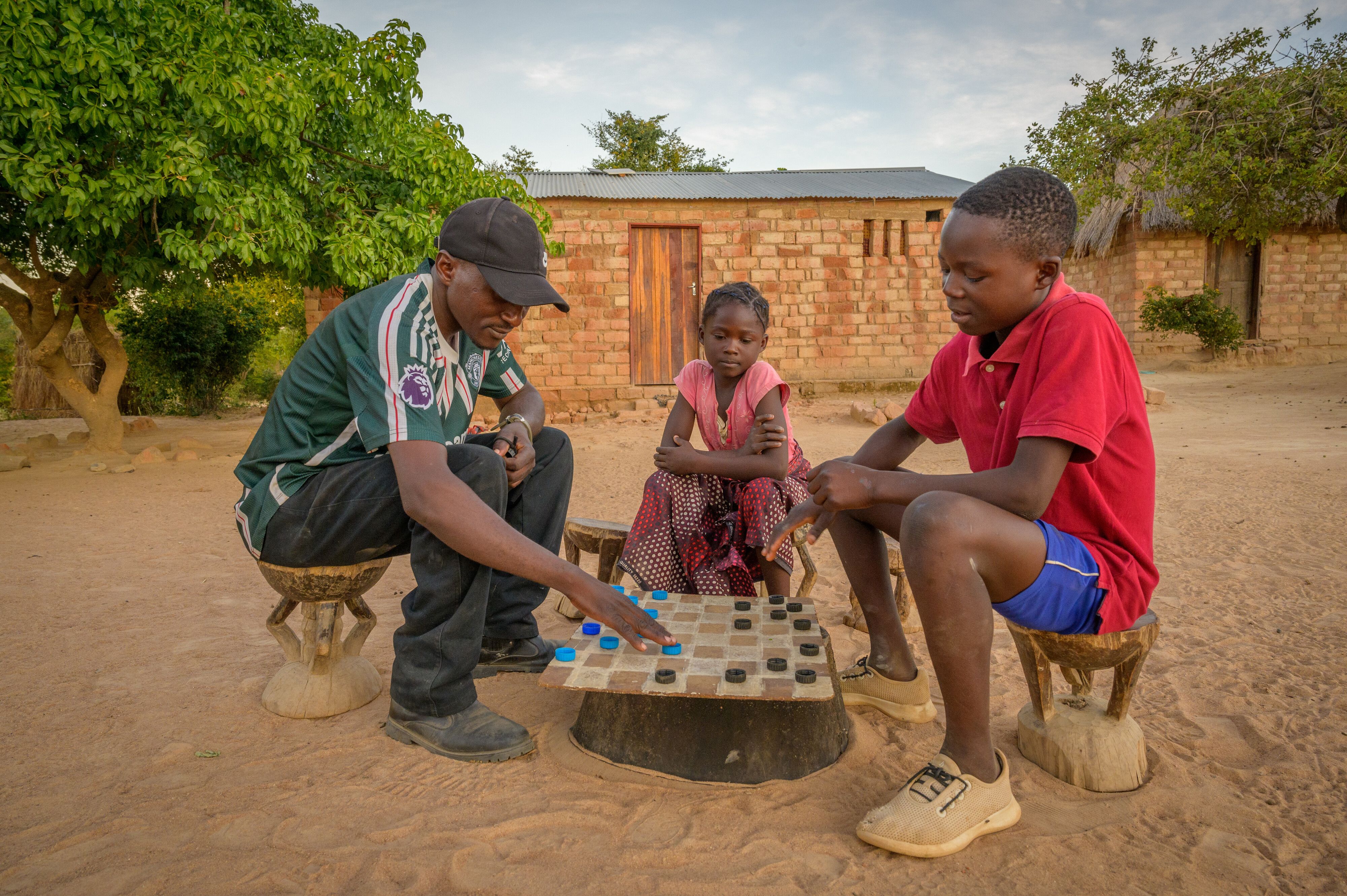
Now, thanks to their financial security, there's time for Caristo and Vincent to focus on a game of checkers, playing on a board Caristo made himself.
Now, thanks to their financial security, there's time for Caristo and Vincent to focus on a game of checkers, playing on a board Caristo made himself.
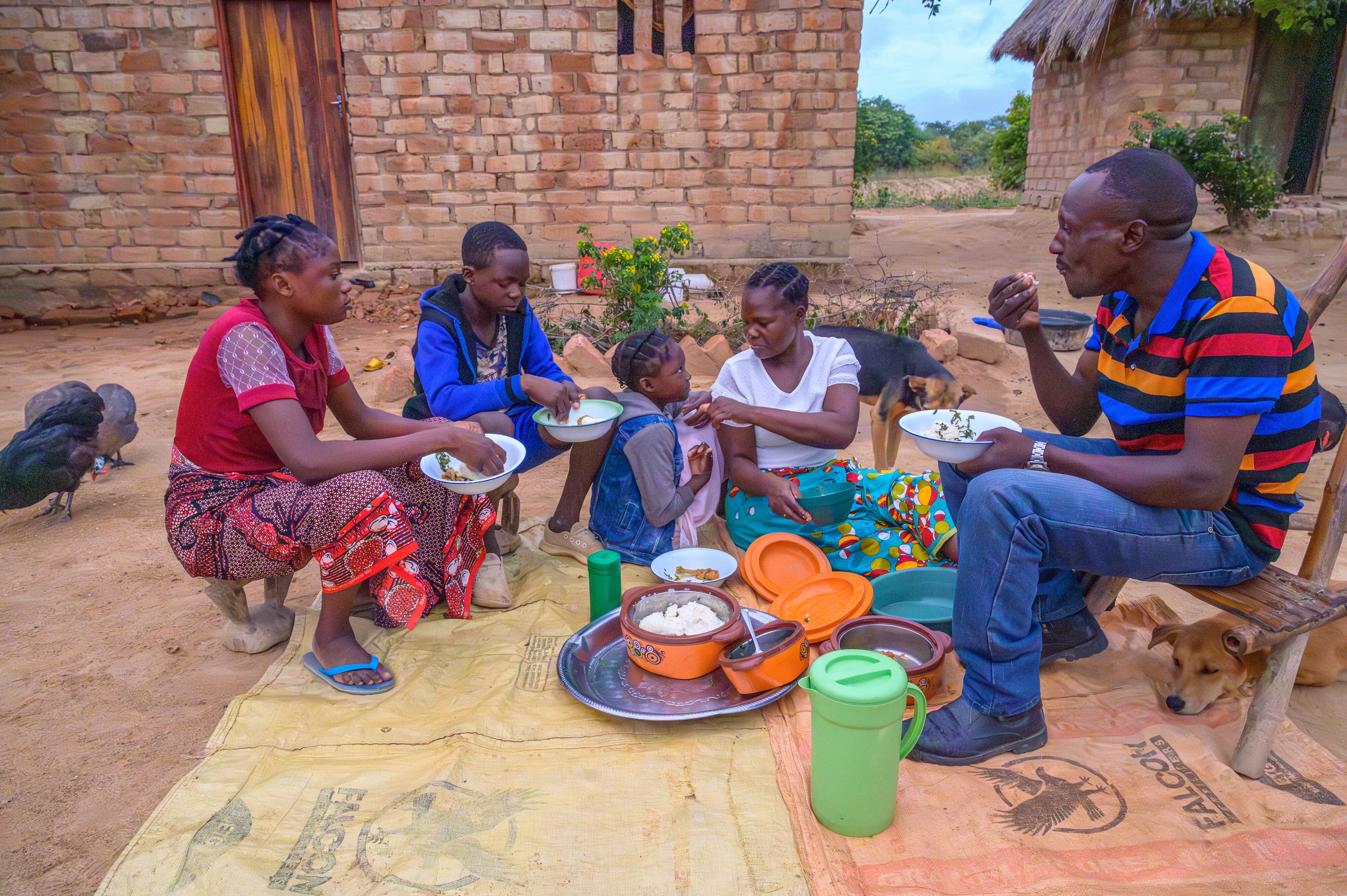
Dinnertime is now family time.
Dinnertime is now family time.
And it’s a new day at the children’s school. In 2022, World Vision built a solar-powered mechanized water system, which provides clean water for the children to drink and to wash with. The school also got new toilets.
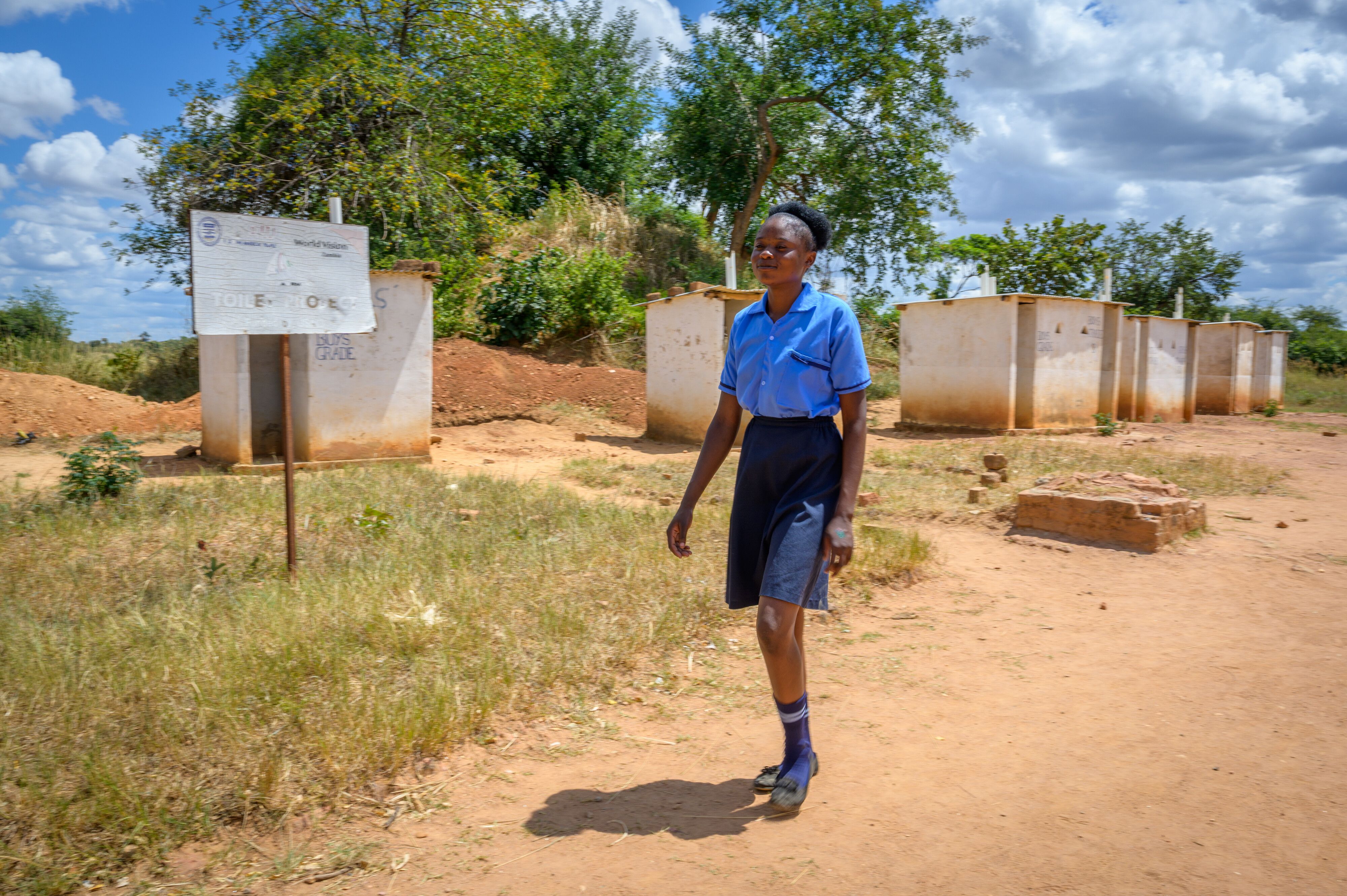
World Vision provided the children’s school with brand-new latrines in addition to the mechanized water system.
World Vision provided the children’s school with brand-new latrines in addition to the mechanized water system.
“World Vision providing water has helped to ease our way,” says the head teacher, Christopher Madubeko. “It was, for the students, a challenge to get from the borehole to the toilets and back from the borehole to the classes. It could take 10 or 20 minutes to come back. Twenty minutes is enough to miss a lesson,” he explains.
Now attendance has doubled, and grades are up.
The school has even taken on a role in strengthening family relationships. Parents are encouraged to attend classes and see what their children are learning. Head teacher Madubeko says Caristo and Jessy are active in their children’s education.
Good things in store
“Goats did this,” says Dominic as he gestures expansively toward all the goods in Caristo and Jessy’s grocery store — the only store in town.
Everything you might need or want is on the counter and the shelves: penny candy, red tomatoes, henna, brightly colored cloth, soda pop, soap, body lotion, plastic buckets, face cream, cookies, detergent, maize, flip-flops, and toothbrushes.
Jessy works at the store during the day, and Viola comes after school to help or laugh and talk with her mother.
“It’s fun to work with Mom,” she says.
Viola is amazed when children come to the store to buy candy. “It surprises me to see kids with money,” she says. But things have changed since she was young. Families everywhere are transforming in a community with 3,712 sponsored children — including Vincent and Vinety — and access to clean water, World Vision trainings, and animals such as goats from the Gift Catalog. Last year alone, the goat population in this area grew from 11,393 to 18,558.
“It makes me happy to be empowered like this. I make my own financial decisions,” says Jessy. One of those decisions: to properly equip her kitchen.
“I have lovely, shiny pots that I bought. Plates, glass cups, the jug that we use to serve visitors,” she says. “A woman’s pride is her kitchen.”
Good for business
In the afternoon, mother and daughter are busy at the store, selling items and greeting neighbors. This family is happy, and that’s good for business.
“Viola’s smile is something that we are happy about because that is one of the requirements when you are dealing with customers,” says Jessy. “If you are not smiling, customers won’t come. But because of her smile and her cheerfulness, we have a lot of customers that come to our shop.”
That smile is also a good reminder for Jessy — that marriages don’t have to stay broken.
“Viola’s smile reminds me of her father’s,” says Jessy. “Even if he’s not at home ... every time I look at her smile, it [is] as if the father is around.”
Caristo is happy, too. “I was an isolated member of the community,” he says. He wouldn’t take the family to church. “I was afraid people would mock me. Laugh at me,” he says. “Now I started buying clothes and shoes. As a result, we are able to start going to church and worship God.”
Church is not only a place of worship; it’s also where Caristo and Jessy can connect with their neighbors, something they were never able to do before. “We are able to share ideas,” says Caristo. You might think you know it all, but as we worship together, we share.”
Playing and praying together
Caristo and son Vincent focus on a game of checkers, playing on a board Caristo made himself. Before the goats came, they never played games.
“It’s very exciting because this is not the way we used to be,” he says, remarking that playing together “has given me a platform to be with my kids, interact with them, and probably help mentor them.” He loves that Virginia is finishing school, Viola wants to become a nurse, Vincent a police officer, and Vinety a teacher. Now, anything is possible.
Mealtimes are different. Before, as tradition dictated, Caristo would eat alone. If there was meat, he would eat it, leaving none for the children. Now the family eats together. “There’s more love shown within our family,” Viola says. “Whatever we do, we do it together.”
That includes praying together — giving thanks as a family — something they never used to do.
“I never knew the importance of praying before eating,” says Caristo. “When she prepared the meal, I would wash my hands and dive in.” Celebrating Families training taught Caristo and his family the importance of time spent together. They take turns thanking God every night — sometimes Jessy, sometimes the children, sometimes Caristo.
A new outlook on his relationship with God, his neighbors, and his family has brought back Caristo’s joy. “His smile is irresistible,” says Dominic. “He’s just such a joy to be with.” And that irresistible smile, inherited from his father, is a beautiful legacy that Caristo is now passing on to his children.
Story published on October 22, 2024
-
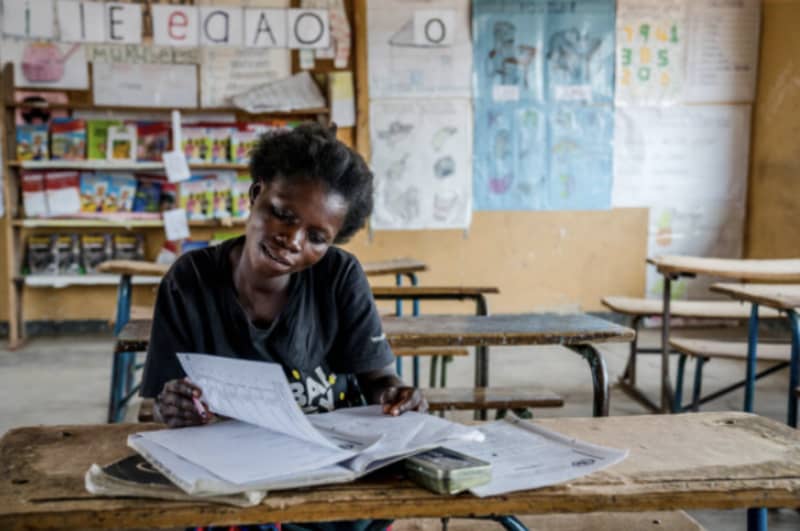
World Vision savings groups: Big returns on small investments
Prisca, a single mother in the Buyantanshi community in Zambia, is using money she saved through a World Vision savings group to fund her own education as well as meet the needs of her baby boy. Through mentorship, financial literacy training, and the Biblical Empowered Worldview program, she’s come to understand that even small savings can redirect her future. -
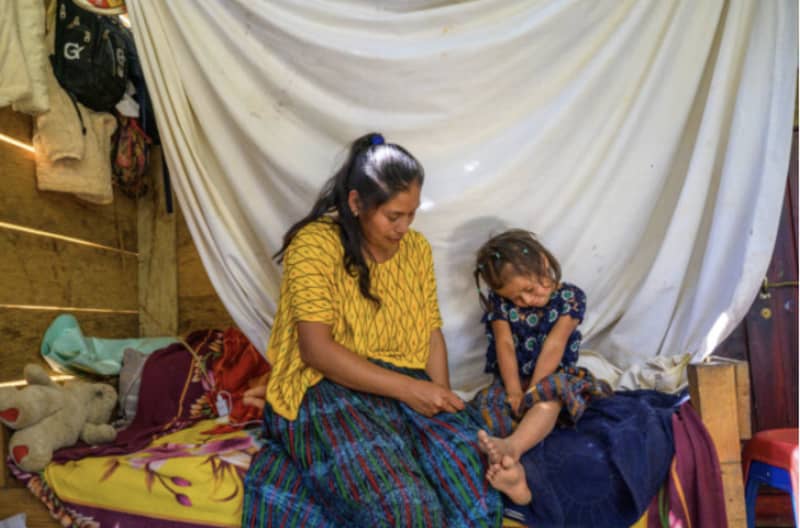
The blessing chain
Animals provided in Guatemala through World Vision’s Gift Catalog program keep on giving after the initial gift. Through a program called Pasando la Bendición, or Passing the Blessing, more families in need receive animals that provide them with reliable nutrition and income. -
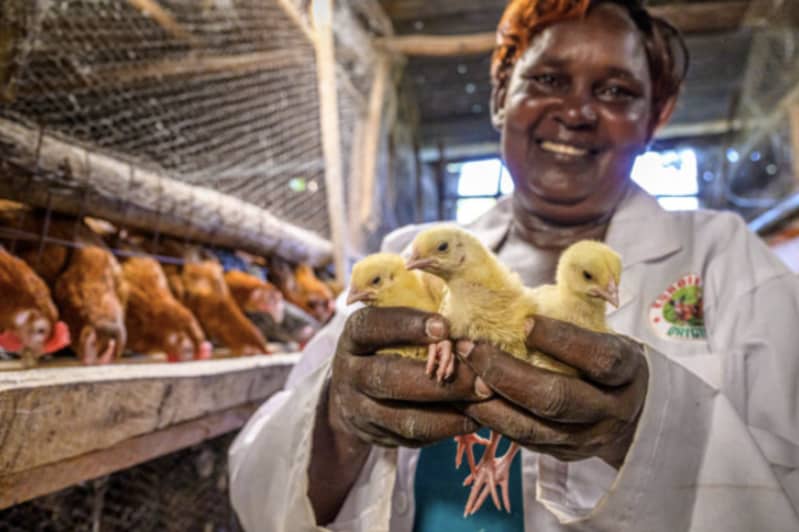
Pure joy
After an unexpected heartbreak, Damaris learned the secret to living a full life through the Biblical Empowered Worldview training. It changed her heart, her mind, and her future. And she isn’t keeping that secret to herself. She’s sharing it with others.

